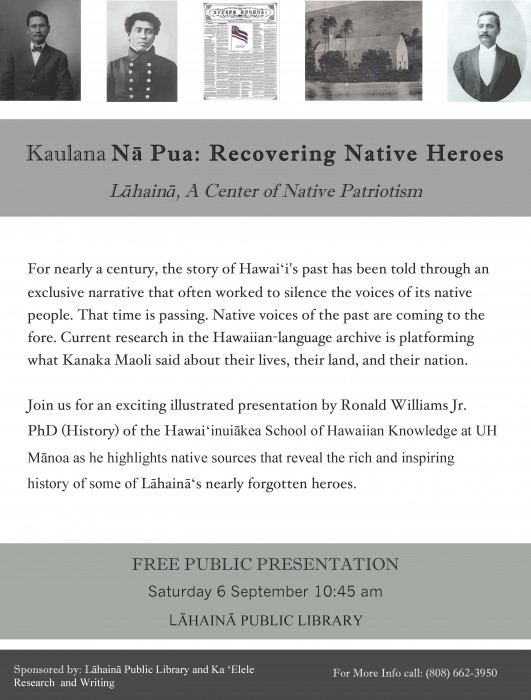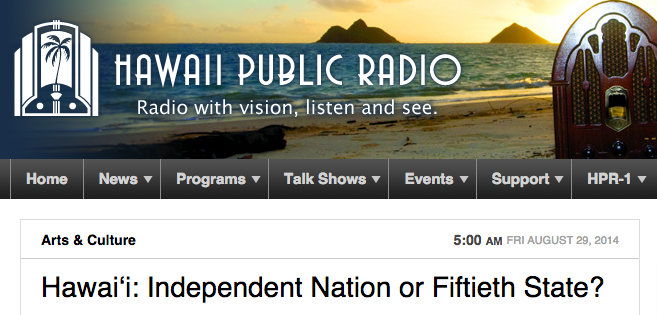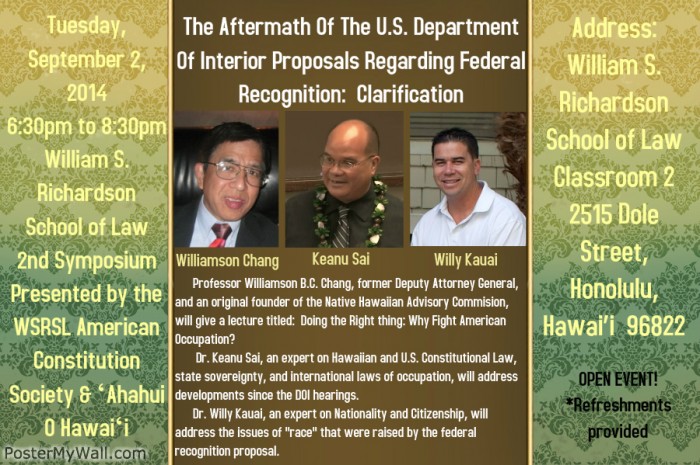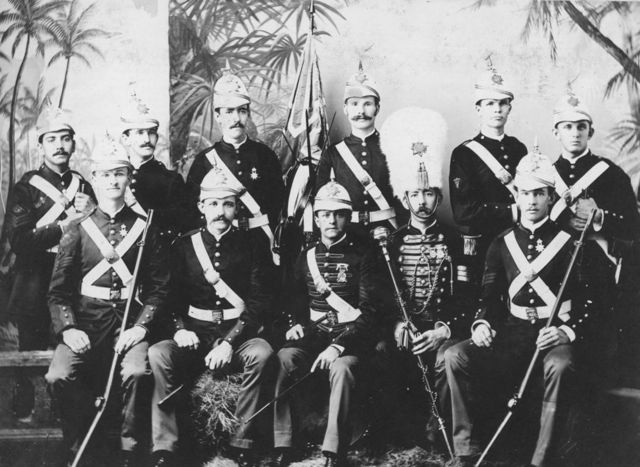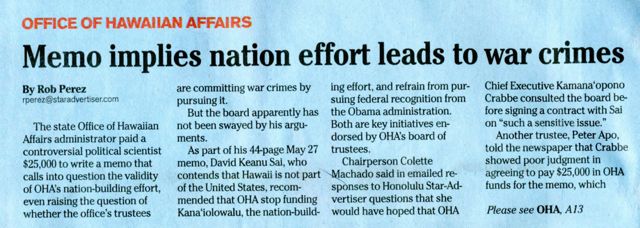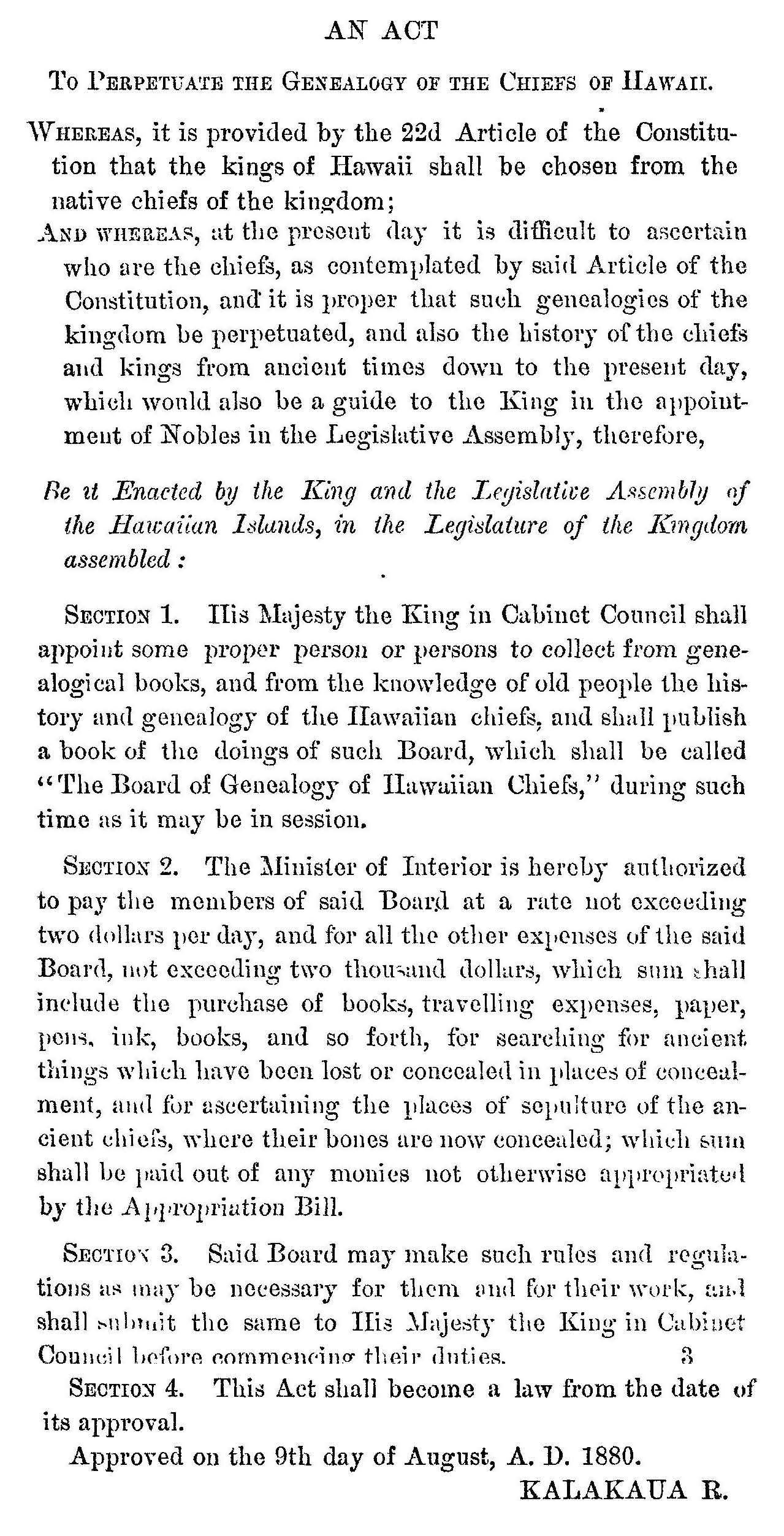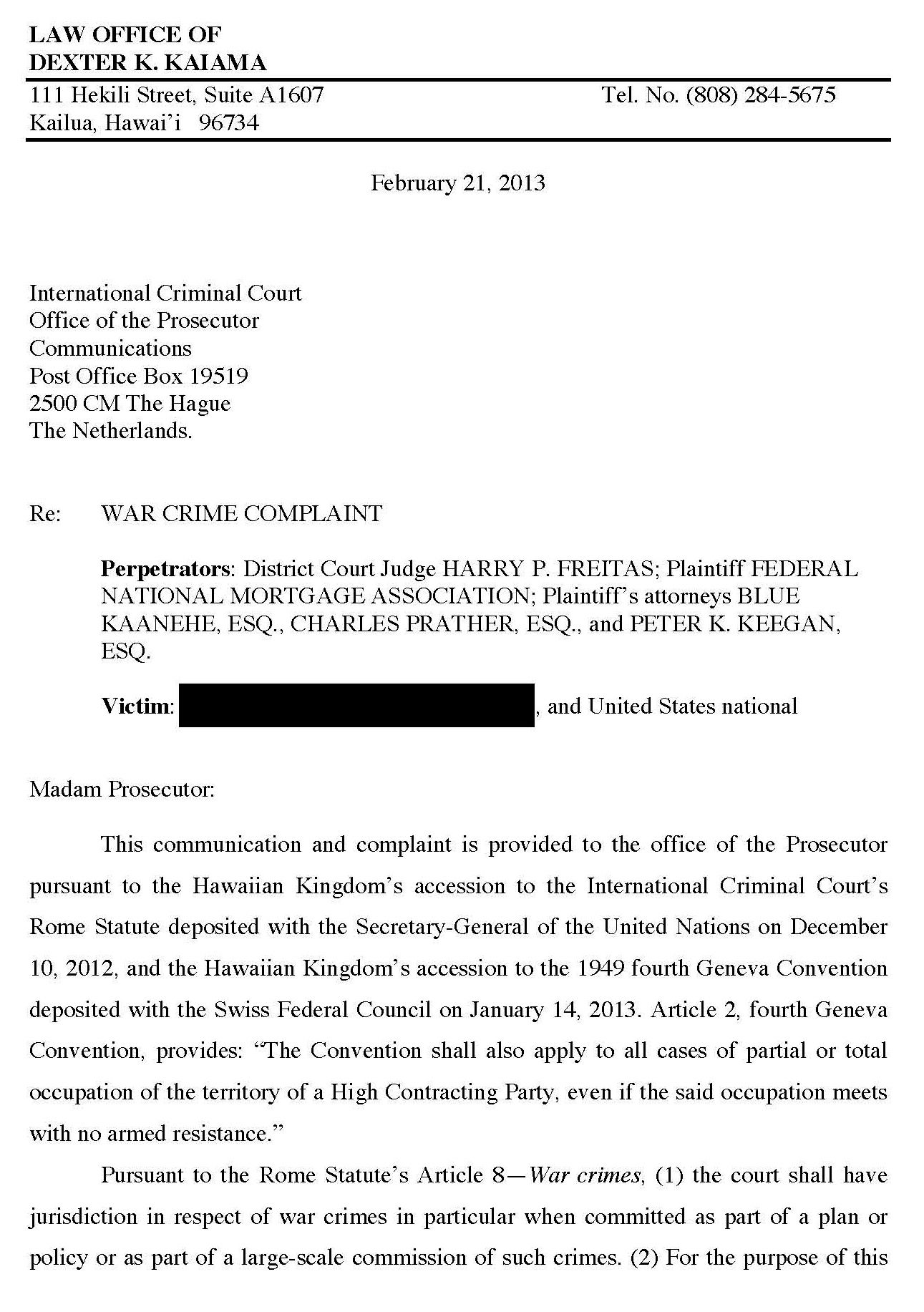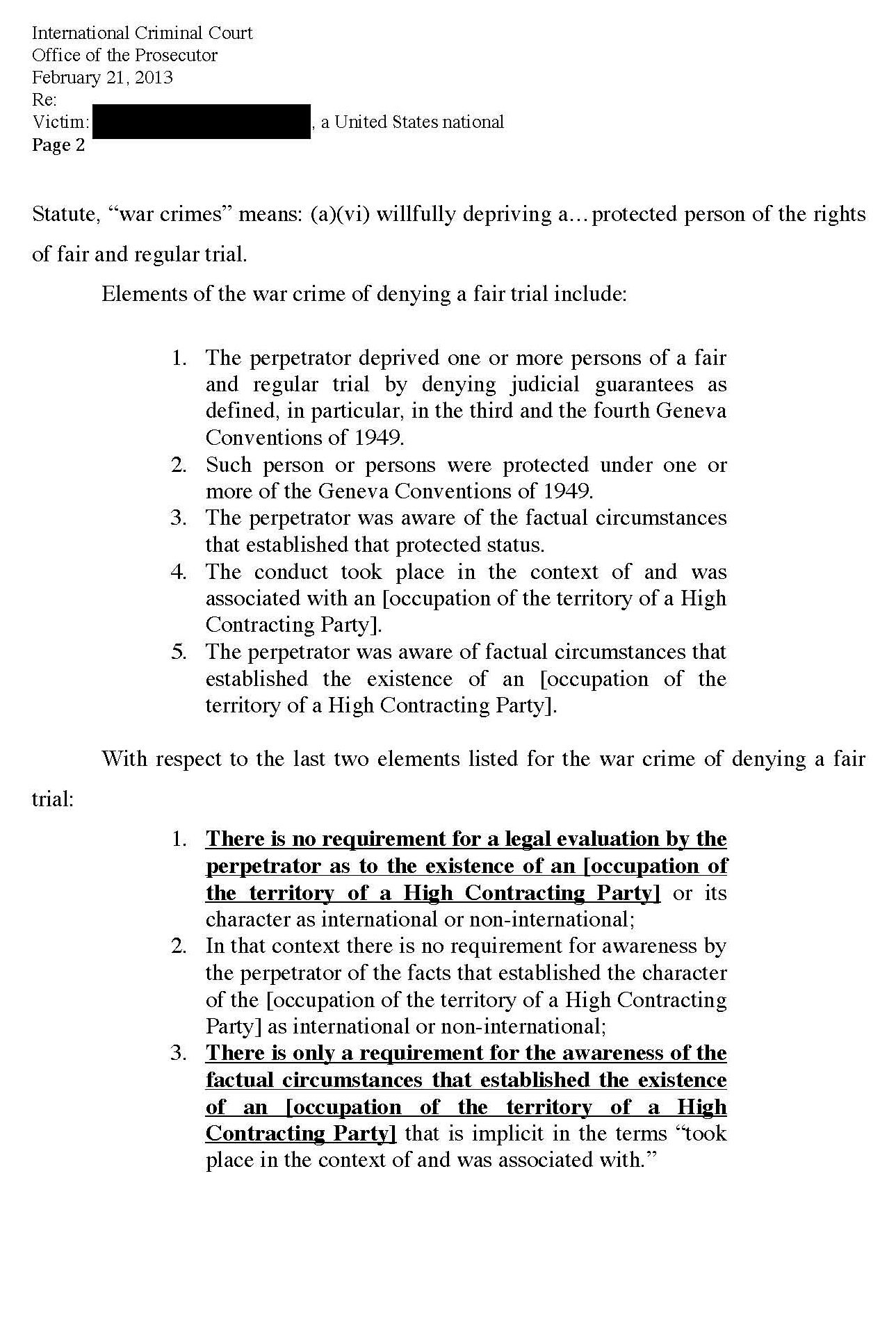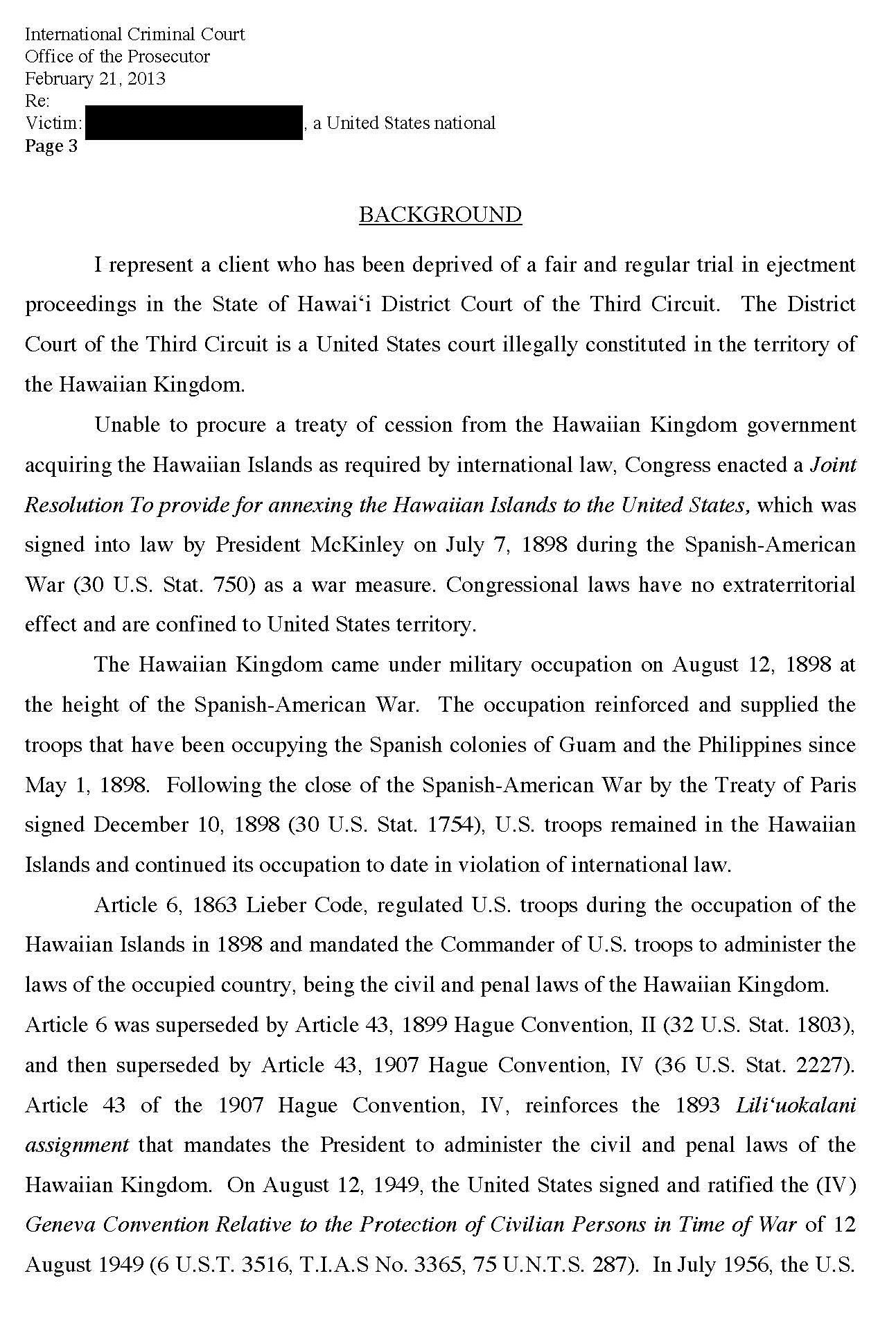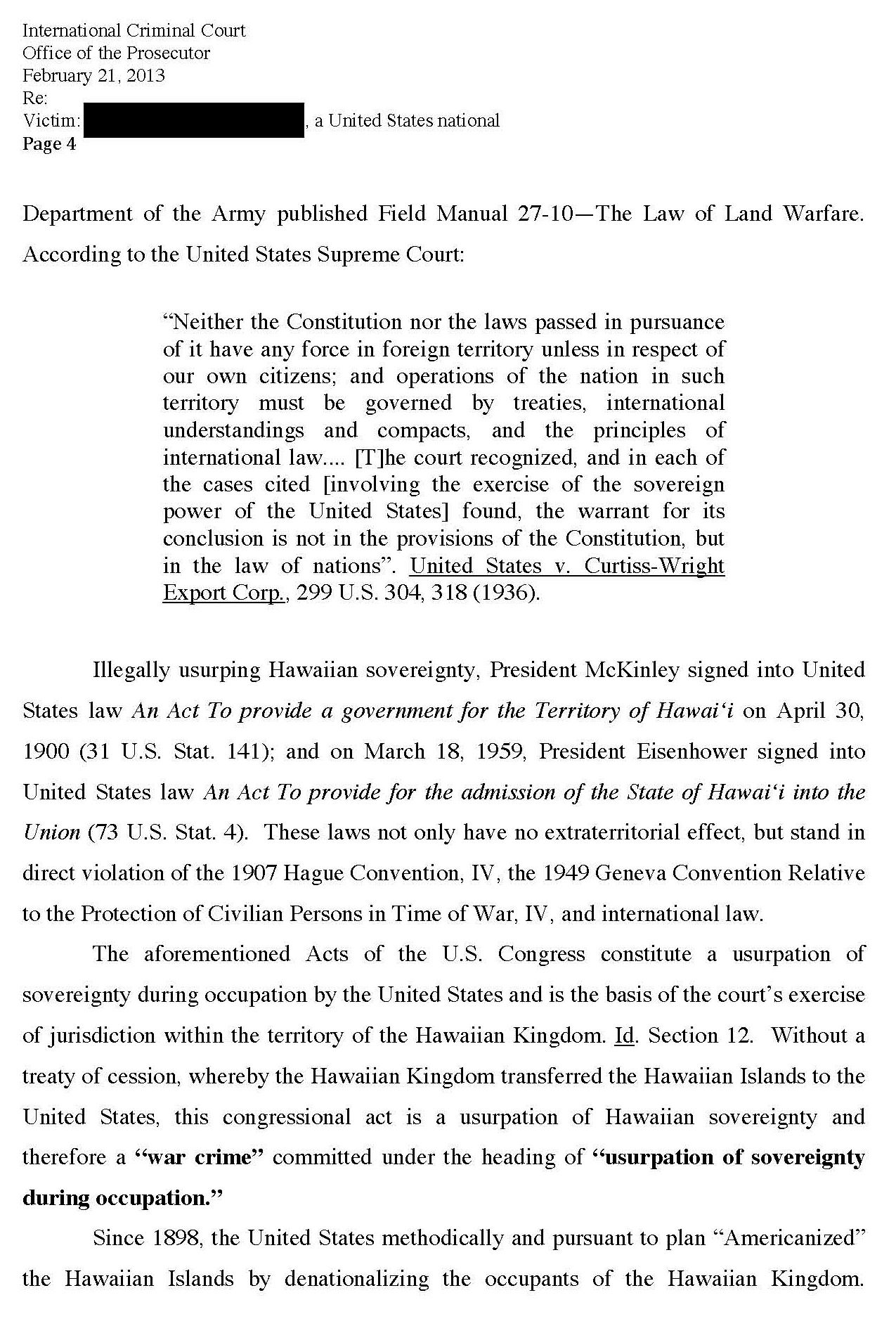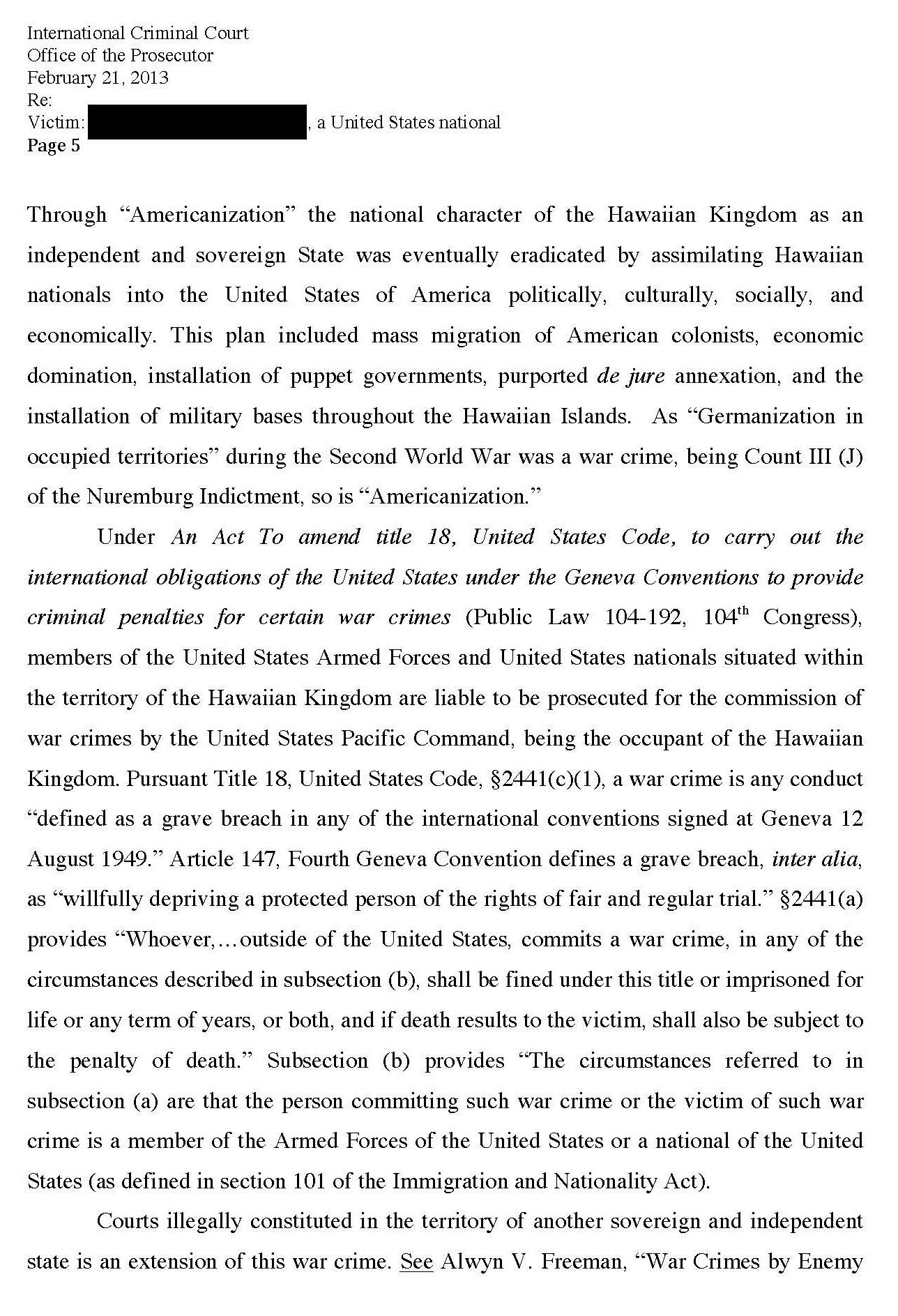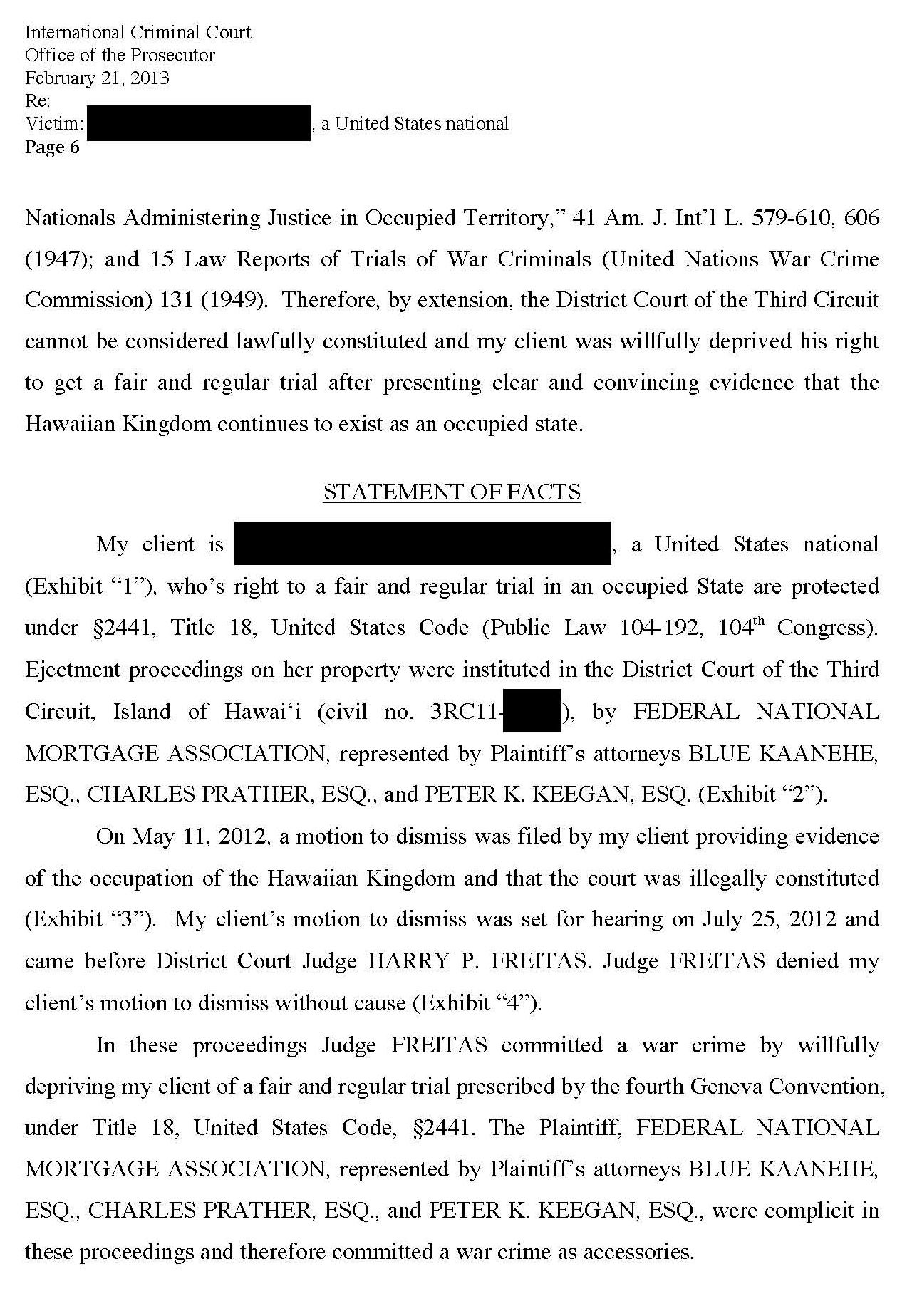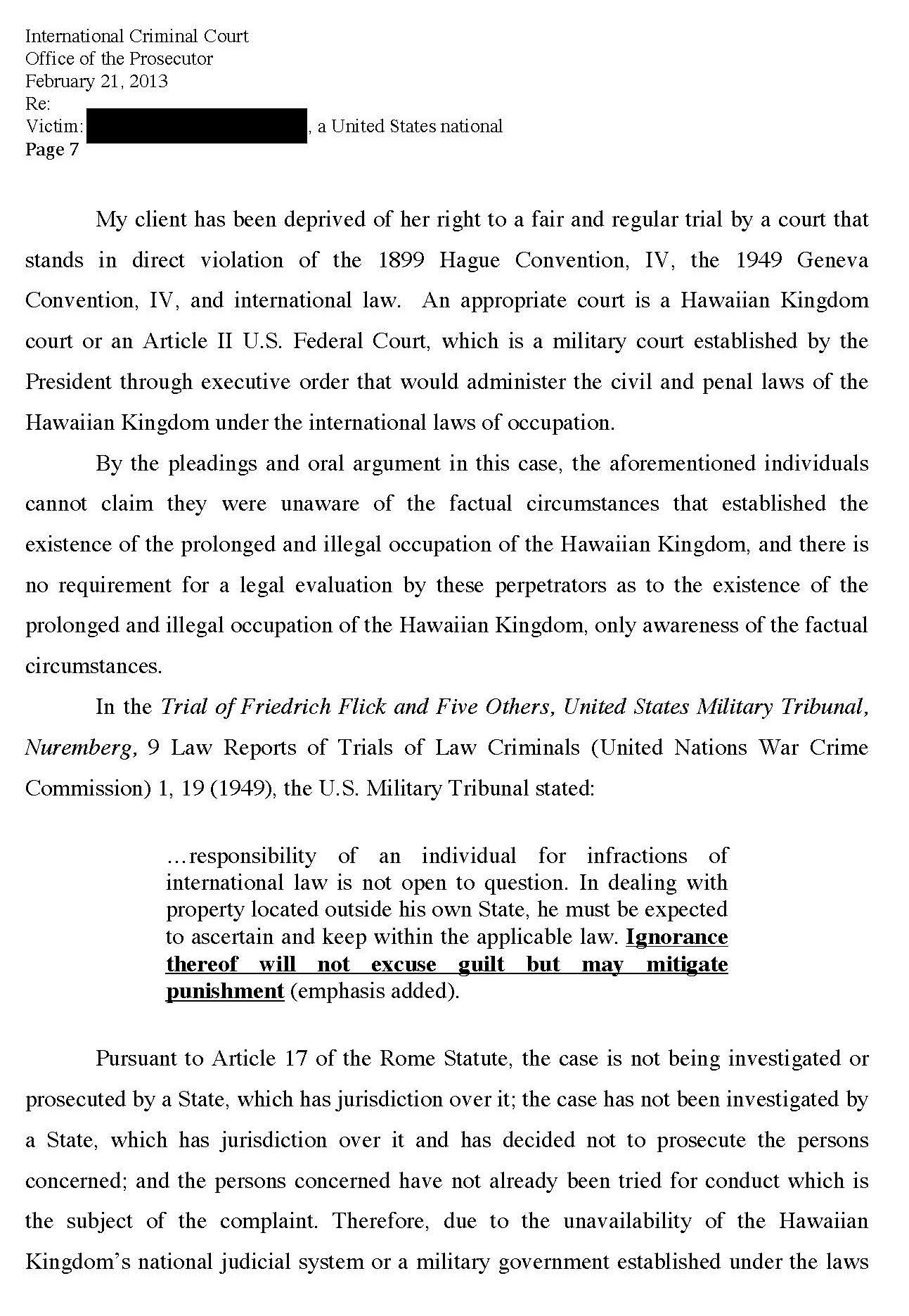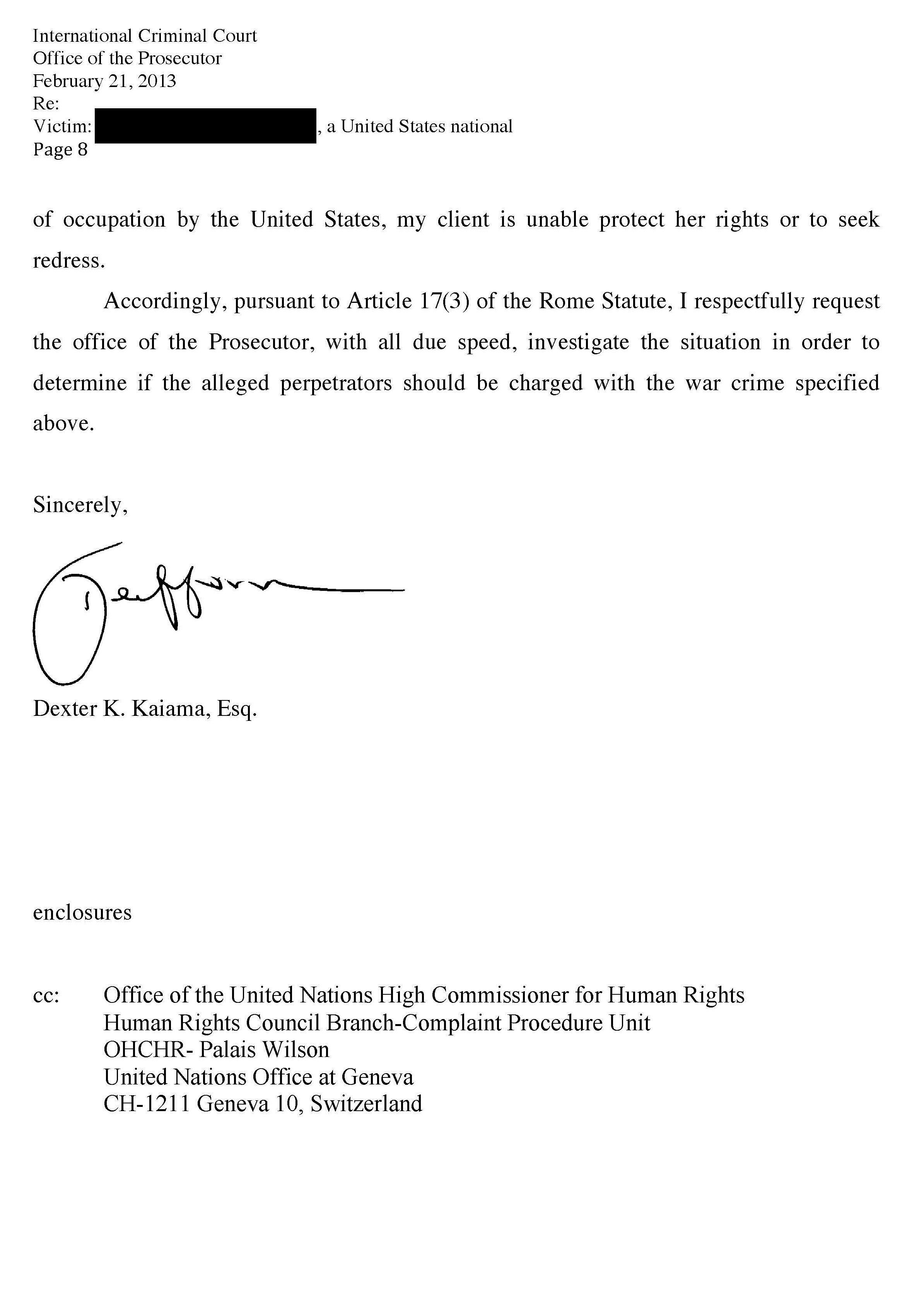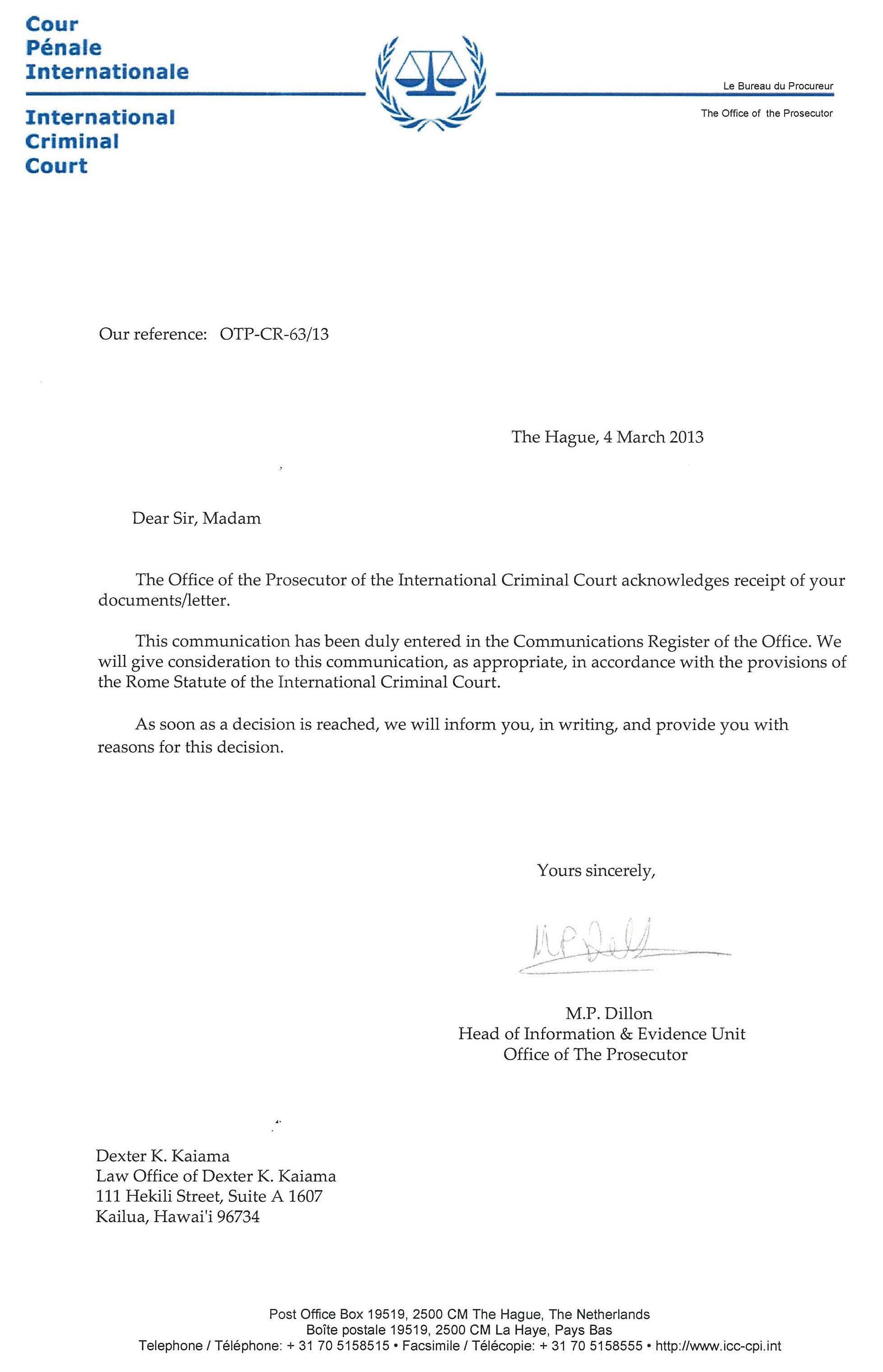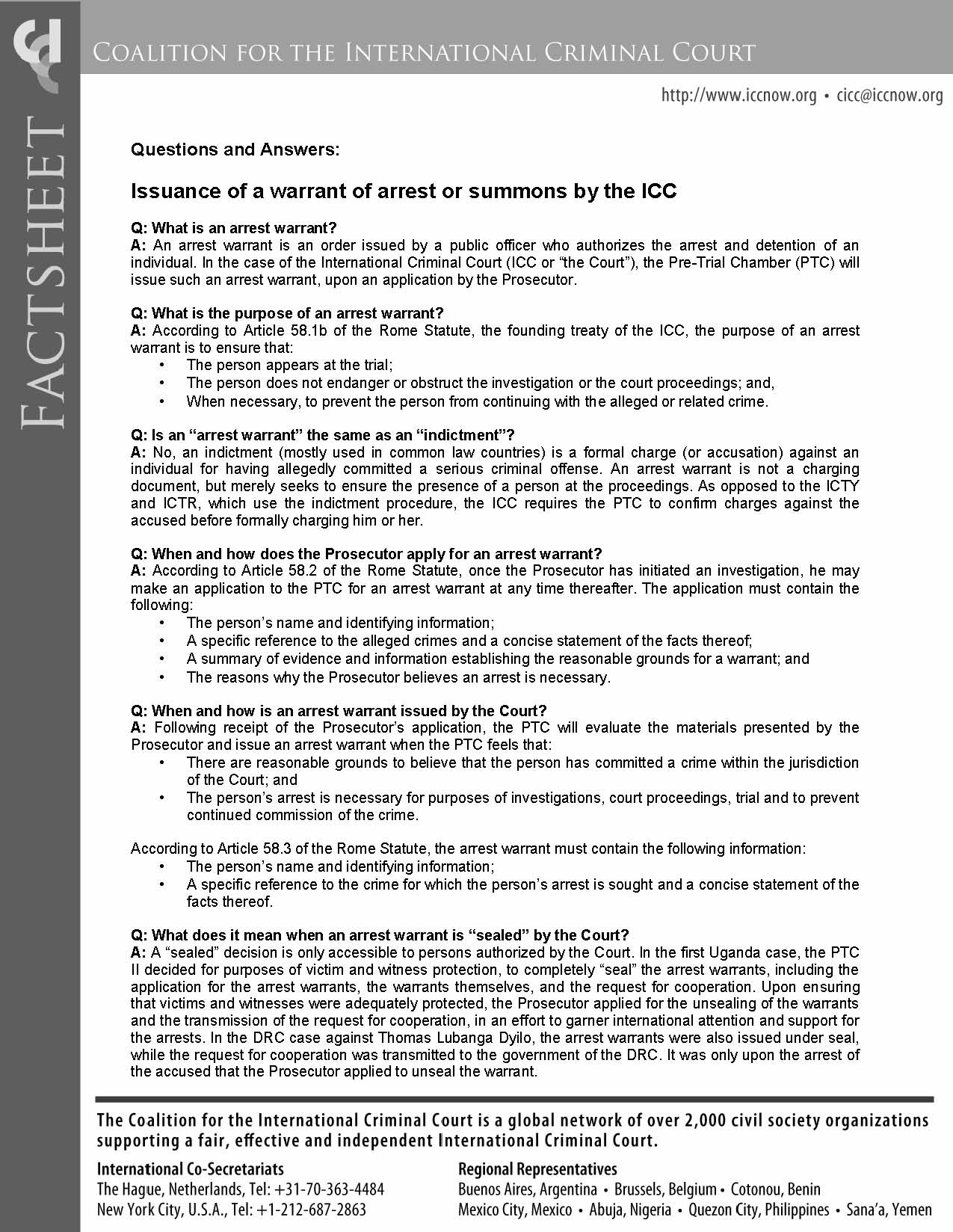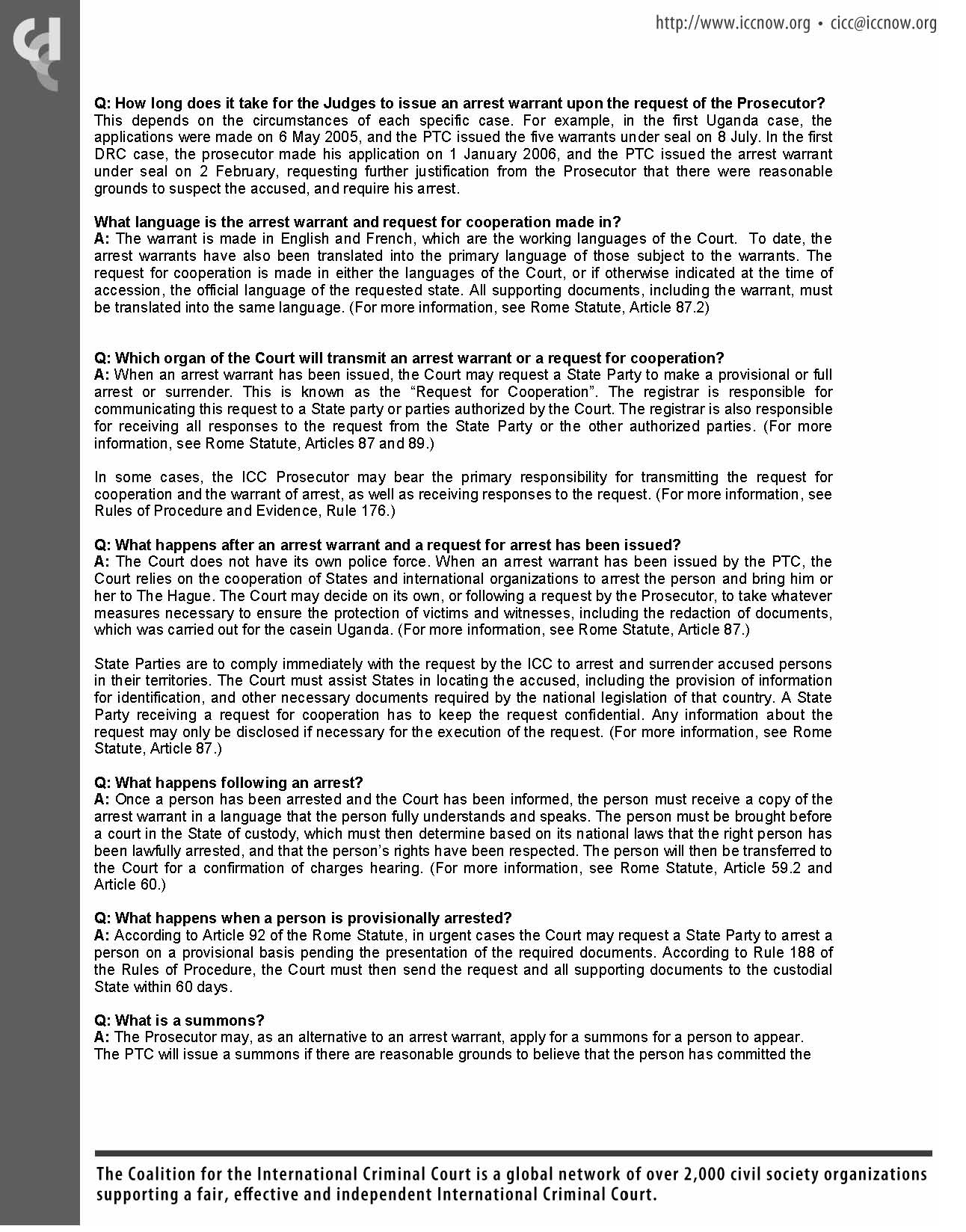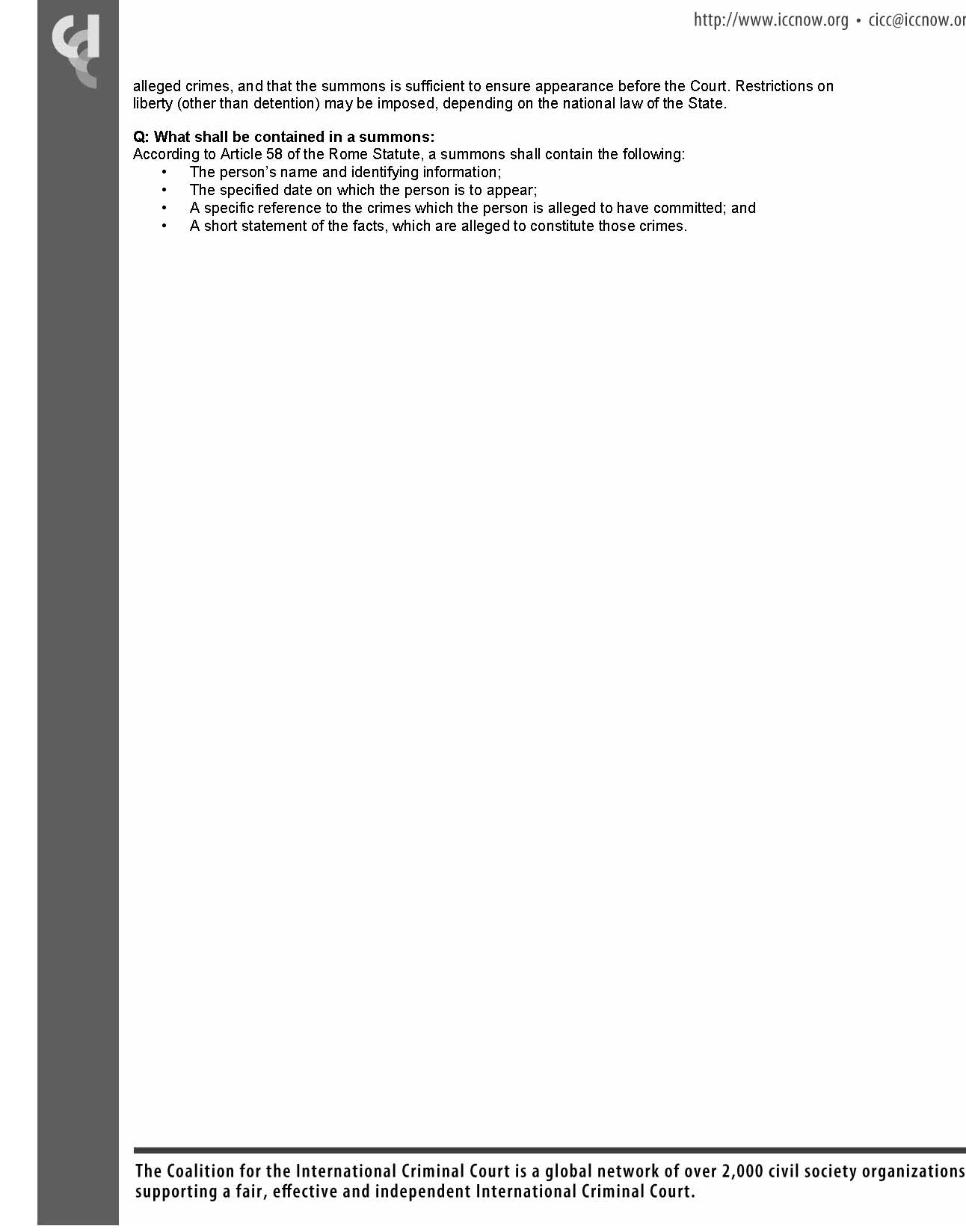Kingdom Media Hawai‘i: Aftermath of the DOI Proposals Regarding Federal Recognition – Clarification
Hawaiian Kingdom Blog
There have been recent inquiries as to the author of the posts on this blog. The answer is that it is the acting government of the Hawaiian Kingdom that authorizes the postings. This blog was established to inform the general public of the actions taken by the acting government and to provide information of a historical, legal or political nature regarding the country. It is not your typical blog that has a moderator to direct and manage the online dialogue. This blog is for informational purposes only and we appreciate the broad base of readership.
The primary objective of the acting government is to expose the occupation of our country within the framework of the 1907 Hague Conventions IV and V and our domestic statutes, and to provide a foundation for transition and the ultimate end of the occupation of the Hawaiian Kingdom. Article 43 of the 1907 Hague Convention IV mandates that the occupying government, being the United States of America, must administer the laws of the occupied State, being the Hawaiian Kingdom, and any deviation of this mandate is a violation of international law.
To understand the legal basis in the formation of the acting government in 1997 under the doctrine of necessity you can download the “The Continuity of the Hawaiian State and the Legitimacy of the acting Government of the Hawaiian Kingdom.” You can also download the acting government’s “Strategic Plan of the acting Council of Regency.” Education is primary and is a fundamental component of the acting government’s strategic plan.
Hawai‘i Public Radio: Hawai‘i – Independent Nation or Fiftieth State?
To listen to Noe Tanigawa’s interview with Dr. Keanu Sai click here.
Hawaiian Rule of Law and the Separation of Powers
Hawaiian governance drew from political ideas of other countries as well as the experience of Hawaiian rulers. Hawai‘i’s history and circumstances were unique because Hawai‘i did not experience the peasant uprisings and revolutions that occurred in Great Britain and France. Legal cultures throughout Europe and the United States did, however, influence the leadership of the Hawaiian Kingdom, especially in the formative years of its transformation from absolute rule to constitutional governance.
Early in his reign, Kamehameha III’s government stood upon the crumbling foundations of a feudal autocracy that could no longer handle the weight of geo-political and economic forces sweeping across the islands. Uniformity of law and the centralization of authority had become a necessity. Increased commercial trade brought an influx of foreigners wishing to reside and conduct business in the Kingdom, requiring changes in the legal system. In 1831, British General William Miller made the following observation of Hawaiian governance at the time:
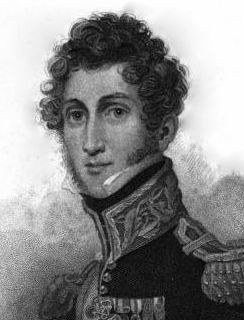 If then the natives wish to retain the government of the islands in their own hands and become a nation, if they are anxious to avoid being dictated to by any foreign commanding officer that may be sent to this station, it seems to be absolutely necessary that they should establish some defined form of government, and a few fundamental laws that will afford security for property; and such commercial regulations as will serve for their own guidance as well as for that of foreigners; if these regulations be liberal, as they ought to be, commerce will flourish, and all classes of people will be gainers.
If then the natives wish to retain the government of the islands in their own hands and become a nation, if they are anxious to avoid being dictated to by any foreign commanding officer that may be sent to this station, it seems to be absolutely necessary that they should establish some defined form of government, and a few fundamental laws that will afford security for property; and such commercial regulations as will serve for their own guidance as well as for that of foreigners; if these regulations be liberal, as they ought to be, commerce will flourish, and all classes of people will be gainers.
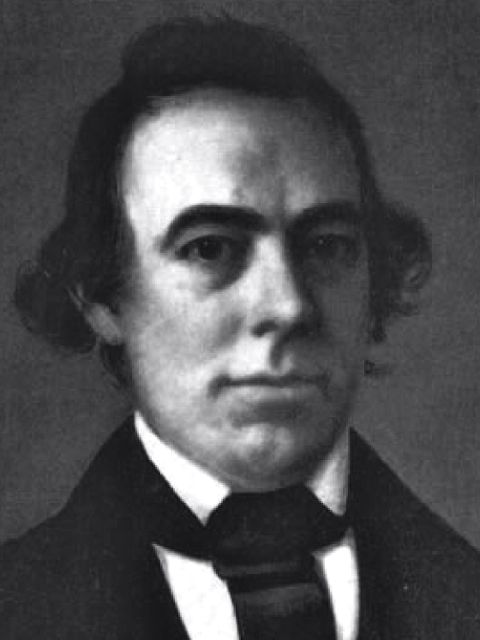 Kamehameha III turned to his religious advisors—the missionaries—for advice. William Richards volunteered to travel to the United States in search of someone to instruct the chiefs on government reform. When Richards was unable to find an instructor he dedicated himself, at the urging of Kamehameha III, to instruct the chiefs on political economy and governance. Richards had no formal education in political science or law but relied on the work of the President of Brown University, Francis Wayland. Wayland was interested in “defining the limits of government by developing a theory of contractual enactment of political society, which would be morally and logically binding and acceptable to all its members.”
Kamehameha III turned to his religious advisors—the missionaries—for advice. William Richards volunteered to travel to the United States in search of someone to instruct the chiefs on government reform. When Richards was unable to find an instructor he dedicated himself, at the urging of Kamehameha III, to instruct the chiefs on political economy and governance. Richards had no formal education in political science or law but relied on the work of the President of Brown University, Francis Wayland. Wayland was interested in “defining the limits of government by developing a theory of contractual enactment of political society, which would be morally and logically binding and acceptable to all its members.”
Richards developed a curriculum based upon Hawaiian translations of Wayland’s two books, “Elements of Moral Science (1835)” and “Elements of Political Economy (1837).” According to Richards, the “lectures themselves were mere outlines of general principles of political economy, which of course could not have been understood except by full illustration drawn from Hawaiian custom and Hawaiian circumstances.” Richards sought to 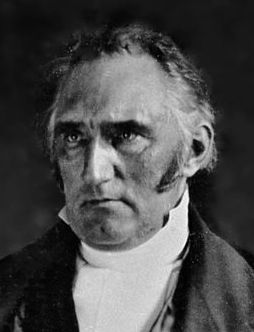 theorize governance from a foundation of natural rights within an agrarian society based upon capitalism that was not only cooperative in nature, but also morally grounded in Christian values. His translation of Wayland’s Elements of Political Economy, states “Peace and tranquility are not maintained when righteousness is not maintained. The righteousness of the chiefs and the people is the only basis for maintaining the laws of the government.” Laws should be enacted to maintain a society for the benefit of all and not the few.
theorize governance from a foundation of natural rights within an agrarian society based upon capitalism that was not only cooperative in nature, but also morally grounded in Christian values. His translation of Wayland’s Elements of Political Economy, states “Peace and tranquility are not maintained when righteousness is not maintained. The righteousness of the chiefs and the people is the only basis for maintaining the laws of the government.” Laws should be enacted to maintain a society for the benefit of all and not the few.
Richards asserted, “God did not establish man as servants for the chiefs and as a means for chiefs to become rich. God provided for the occupation of government leaders in order to bless the people and so that the nation benefits.” Wayland’s theory of cooperative capitalism, with private ownership of land and a free market as the foundation of political economy, was difficult to implement because the Kingdom was in a feudal state since the rule of Kamehameha I. Individuals could not hold land titles in the form of freehold titles, e.g. fee-simple and life estates. Therefore, personal property and agriculture formed the basis of the Hawaiian economy at this stage. According to an 1840 statute,
“The business of the Governors, and land agents [Konohiki], and tax officers of the general tax gatherer, is as follows: to read frequently this law to the people on all days of public work, and thus shall the landlords do in the presence of their tenants on their working days. Let every one also put his own land in a good state, with proper reference to the welfare of the body, according to the principles of Political Economy. The man who does not labor enjoys little happiness. He cannot obtain any great good unless he strives for it with earnestness. He cannot make himself comfortable, not even preserve his life unless he labor for it. If a man wish to become rich, he can do it in no way except to engage with energy in some business. Thus Kings obtain kingdoms by striving for them with energy.”
The Hawaiian Kingdom was moving towards developing and adhering to the “rule of law,” where there exists a government of law and not a government of chiefs. In the preamble of the 1840 Constitution it provides, “Protection is hereby secured to the persons of all the people, together with their lands, their building lots, and all their property, while they conform to the laws of the kingdom, and nothing whatever shall be taken from any individual except by express provision of the laws. Whatever chief shall act perseveringly in violation of this constitution, shall no longer remain a chief of the Hawaiian Islands, and the same shall be true of the Governors, officers, and all land agents.”
Under a feudal autocracy, the chiefs who held authority over the people under them had the sole authority to enact laws, execute laws and be the judge of the violation of these laws over the people. Hawaiian constitutionalism sought the transfer of the inherent authority of the chiefs into a single government that would enact laws that would apply equally to both chiefs and people together. To do this would be to achieve the cornerstone of constitutionalism—separation of powers.
Separation of powers refers to government responsibilities divided into distinct branches that prevent one branch from exercising the function of another branch. Hawaiian constitutional law separates government into three branches: the legislative, which is responsible for enacting laws and appropriating a budget for the operation of government; the executive, which is responsible for executing laws enacted by the legislative branch and the administration of government; and the judicial, which is responsible for the interpretation of the constitution and laws when disputes are brought before the courts.
Although, the Hawaiian Kingdom was a constitutional monarchy since 1840, it did not achieve the separation of powers until 1864. For 24 years the Hawaiian government operated more under a theory of sharing of power between the three Estates of the kingdom: the Monarch, Nobles and the People, rather than a separation of power theory. Under the first constitution in 1840, the King’s duty was to execute the laws of the land, serve as chief judge of the Supreme Court, and sit as a member of the House of Nobles that would enact laws together with representatives chosen from the People.
The 1852 Constitution was the first step toward separating the branches, where Article 23 stated: “The Supreme power of the Kingdom, in its exercise, is divided into the Executive, Legislative and Judicial; these are to be preserved distinct; the two last powers cannot be united in any one individual or body.” The King, however, who heads executive branch, could still create legislation without the participation of the legislative branch. Article 45 provided, “All important business of the Kingdom which the King chooses to transact in person, he may do, but not without the approbation of the Kuhina Nui (Premier). The King and the Kuhina Nui shall have a negative on each other’s public acts.” In other words, this provision was a loophole that needed to be addressed. Another cross over of branches under the 1852 Constitution were that two sitting Justices of the Hawaiian Kingdom Supreme Court, George M. Robertson and Lawrence McCully, were elected Representatives in the legislative branch. Both Justices also served as Speaker of the House of Representatives.
The separation of powers was finally accomplished under the 1864 Constitution when the provision of Article 45 was removed and Judges were barred from serving as elected Representatives in the Legislative Assembly. Article 20 of the 1864 Constitution provides, “The Supreme Power of the Kingdom in its exercise, is divided into the Executive, Legislative, and Judicial; these shall always be preserved distinct, and no Judge of a Court of Record shall ever be a member of the Legislative Assembly.”
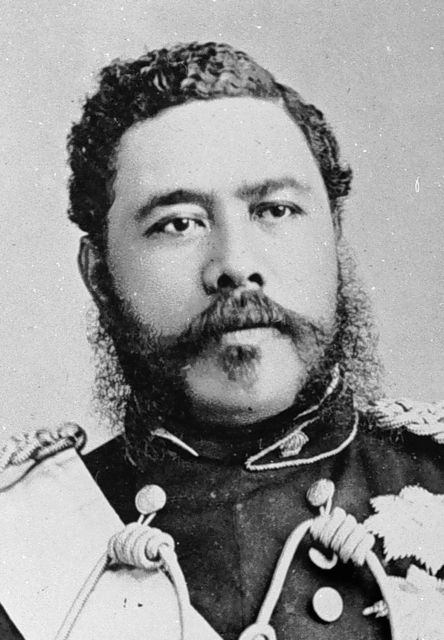 When King Kalakaua was forced to sign the 1887 Bayonet Constitution, he did so as the head of the executive branch, which was separate and distinct from the legislative branch. Since 1864, the executive was limited and confined to executing Hawaiian laws enacted by the Legislative Assembly and the administration of government. It did not have the ability to enact legislation as Kamehameha V did under Article 45 of the 1852 Constitution. The only branch that could change or amend the 1864 Constitution was solely the legislative branch. According to Article 80 of the 1864 Constitution:
When King Kalakaua was forced to sign the 1887 Bayonet Constitution, he did so as the head of the executive branch, which was separate and distinct from the legislative branch. Since 1864, the executive was limited and confined to executing Hawaiian laws enacted by the Legislative Assembly and the administration of government. It did not have the ability to enact legislation as Kamehameha V did under Article 45 of the 1852 Constitution. The only branch that could change or amend the 1864 Constitution was solely the legislative branch. According to Article 80 of the 1864 Constitution:
“Any amendment or amendments to this Constitution may be proposed in the Legislative Assembly, and if the same shall be agreed to by a majority of the members thereof, such proposed amendment or amendments shall be entered on its journal, with the yeas and nays taken thereon, and referred to the next Legislature; which proposed amendment or the next election of Representatives; and if in the next Legislature such proposed amendment or amendments shall be agreed to by two-thirds of all members of the Legislative Assembly, and be approved by the King, such amendment or amendments shall become part of the Constitution of this country.”
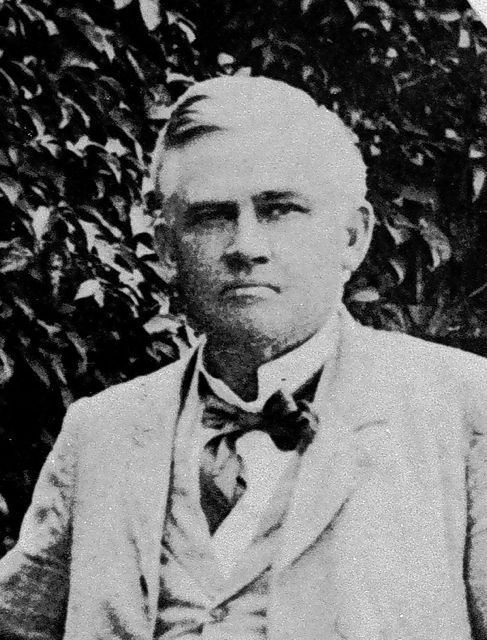 In his final report dated July 17, 1893, to U.S. Secretary of State Walter Gresham, U.S. Special Commissioner, James Blount, interviewed the Chief Justice of the Hawaiian Kingdom that centered on the 1887 Bayonet Constitution. Unbeknownst to Blount at the time of the interview, the Chief Justice was a co-conspirator along with Associate Justice Edward Preston who assisted in the drafting of the Bayonet Constitution.
In his final report dated July 17, 1893, to U.S. Secretary of State Walter Gresham, U.S. Special Commissioner, James Blount, interviewed the Chief Justice of the Hawaiian Kingdom that centered on the 1887 Bayonet Constitution. Unbeknownst to Blount at the time of the interview, the Chief Justice was a co-conspirator along with Associate Justice Edward Preston who assisted in the drafting of the Bayonet Constitution.
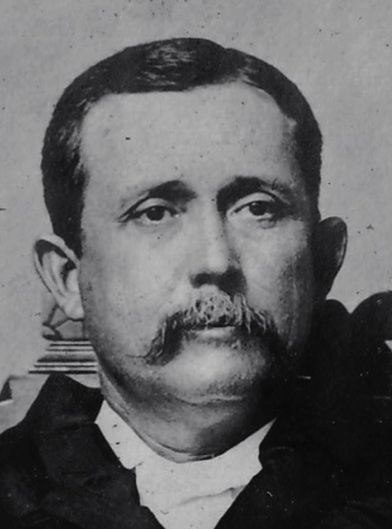 Blount reported, “At this point I invite attention to the following extract from a formal colloquy between Chief Justice Judd and myself touching the means adopted to extort the constitution of 1887, and the fundamental changes wrought through that instrument:
Blount reported, “At this point I invite attention to the following extract from a formal colloquy between Chief Justice Judd and myself touching the means adopted to extort the constitution of 1887, and the fundamental changes wrought through that instrument:
Q. Was that constitution ever submitted to a popular vote for ratification?
A. No; it was not. There was no direct vote ratifying the constitution, but its provisions requiring that no one should vote unless he had taken an oath to support it, and a large number voted at that first election, was considered a virtual ratification of the constitution.
Q. If they voted at all they were considered as accepting it?
A. Yes, sir. I do not think any large number refused to take the oath to it.
Q. It was not contemplated by the mass meeting, nor the cabinet, nor anybody in power to submit the matter of ratification at all?
A. No, it was not. It was considered a revolution. It was a successful revolutionary act.
Q. And, therefore, was not submitted to a popular vote for ratification?
A. Yes, sir. It had mischievous effects in encouraging the Wilcox revolution of 1889, which was unsuccessful. I think it was a bad precedent, only the exigencies of the occasion seemed to demand it.
The 1887 Bayonet Constitution was never a constitution to begin with, but merely the act of an insurgency in the commission of the crime of high treason. The 1864 Constitution was never annulled and remained the Constitution of the country. To treat the 1887 Bayonet Constitution as if it were a Constitution of the country is to violate the Hawaiian Rule of Law, even if it was done through ignorance. But to move beyond ignorance is to dangerously move along the lines of the insurgency.
King Kalakaua and Queen Lili‘uokalani were not a part of any insurgency, but were Heads of State that had to deal with the insurgency that was both political and criminal. Both 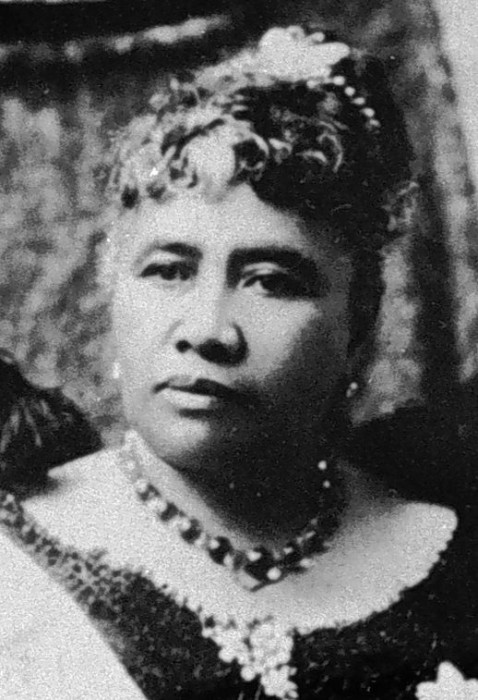 Monarchs were not “above” the Constitution of the country, but were “under” it. This was acknowledged by the Queen in her diplomatic protest to the United States President on January 17, 1893. The protest stated, “I, Liliuokalani, by the grace of God and under the constitution of the Hawaiian Kingdom, Queen, do hereby solemnly protest against any and all acts done against myself and the constitutional Government of the Hawaiian Kingdom by certain persons claiming to have established a provisional government of and for this Kingdom.”
Monarchs were not “above” the Constitution of the country, but were “under” it. This was acknowledged by the Queen in her diplomatic protest to the United States President on January 17, 1893. The protest stated, “I, Liliuokalani, by the grace of God and under the constitution of the Hawaiian Kingdom, Queen, do hereby solemnly protest against any and all acts done against myself and the constitutional Government of the Hawaiian Kingdom by certain persons claiming to have established a provisional government of and for this Kingdom.”
Everyone in the Hawaiian Islands is subject to the laws of the Hawaiian Kingdom, whether Hawaiian subjects or aliens. §6 of the Hawaiian Civil Code, provides:
“The laws are obligatory upon all persons, whether subjects of this kingdom, or citizens or subjects of any foreign State, while within the limits of this kingdom, except so far as exception is made by the laws of nations in respect to Ambassadors or others. The property of all such persons, while such property is within the territorial jurisdiction of this kingdom, is also subject to the laws.”
University of Hawai‘i Law School: Aftermath of the DOI Proposals Regarding Federal Recognition – Clarification
Hawaiian Constitutionalism
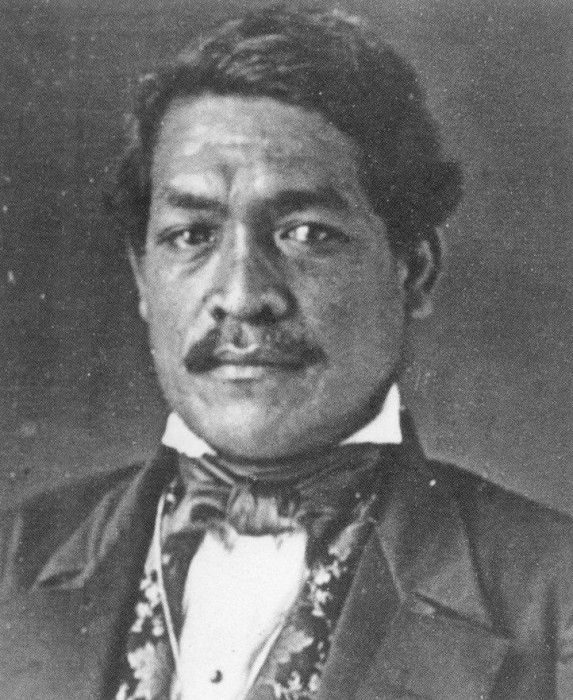 On June 7, 1839, Kamehameha III proclaimed an expanded uniform code of laws preceded by a “Declaration of Rights” that formally acknowledged and vowed to protect the natural rights of life, limb, and liberty for both chiefs and people. The code provided that “no chief has any authority over any man, any farther than it is given him by specific enactment, and no tax can be levied, other than that which is specified in the printed law, and no chief can act as a judge in a case where he is personally interested, and no man can be dispossessed of land which he has put under cultivation except for crimes specified in the law.”
On June 7, 1839, Kamehameha III proclaimed an expanded uniform code of laws preceded by a “Declaration of Rights” that formally acknowledged and vowed to protect the natural rights of life, limb, and liberty for both chiefs and people. The code provided that “no chief has any authority over any man, any farther than it is given him by specific enactment, and no tax can be levied, other than that which is specified in the printed law, and no chief can act as a judge in a case where he is personally interested, and no man can be dispossessed of land which he has put under cultivation except for crimes specified in the law.”
1840 Constitution
On October 8, 1840, Kamehameha III approved the first constitution incorporating the Declaration of Rights as its preamble.
The purpose of a written constitution was “to lay down the general features of a system of government and to define to a greater or less extent the powers of such government, in relation to the rights of persons on the one hand, and on the other…in relation to certain other political entities which are incorporated in the system.” The first constitution did not provide for separation of powers (e.g. executive, legislative and judicial). The King’s duty was to execute the laws of the land, serve as chief judge of the Supreme Court, and sit as a member of the House of Nobles that would enact laws together with representatives chosen from the people. The first constitution was not a limitation of power, but a sharing of power. Kamehameha III declared and established the equality of all his subjects before the law and voluntarily divested himself of his power as an absolute Ruler. According to the Hawaiian Supreme Court, in Rex v. Booth, 3 Hawai‘i 616, 630 (1863):
“King Kamehameha III originally possessed, in his own person, all the attributes of absolute sovereignty. Of his own free will he granted the Constitution of 1840, as a boon to his country and people, establishing his Government upon a declared plan or system, having reference not only to the permanency of his Throne and Dynasty, but to the Government of his country according to fixed laws and civilized usage, in lieu of what may be styled the feudal, but chaotic and uncertain system, which previously prevailed.”
In 1845, Kamehameha III refocused his attention on domestic affairs, and the organization and maintenance of the newly established constitutional monarchy. On October 29th, he commissioned Robert Wyllie of Scotland to be Minister of Foreign Affairs; G.P. Judd, a former missionary, as Minister of Finance; William Richards as Minister of Education; and John Ricord, as Attorney General. All were granted Hawaiian citizenship prior to their appointments. These appointments sparked controversy and renewed concerns of foreign takeover. Responding to a slew of appeals to remove these foreign advisors for native chiefs, Kamehameha III wrote the following letter that speaks to the tenor of the time and circumstances the kingdom faced:
“Kind greetings to you with kindly greetings to the old men and women of my ancestors’ time. I desire all the good things of the past to remain such as the good old law of Kamehameha that “the old women and the old men shall sleep in safety by the wayside,” and to unite with them what is good under these new conditions in which we live. That is why I have appointed foreign officials, not out of contempt for the ancient wisdom of the land, but because my native helpers do not yet understand the laws of the great countries who are working with us. That is why I have dismissed them. I see that I must have new officials to help with the new system under which I am working for the good of the country and of the old men and women of the country. I earnestly desire to give places to the commoners and to the chiefs, as they are able to do the work connected with the office. The people who have learned the new ways I have retained. Here is the name of one of them, G.L. Kapeau, Secretary of the Treasury. He understands the work very well, and I wish there were more such men. Among the chiefs Leleiohoku, Paki, and John Young [Keoniana] are capable of filling such places and they already have government offices, one of them over foreign officials. And as soon as the young chiefs are sufficiently trained I hope to give them the places. But they are not now able to become speakers in foreign tongues. I have therefore refused the letters of appeal to dismiss the foreign advisors, for those who speak only the Hawaiian tongue.”
John Ricord arrived in the Hawaiian Islands from Oregon on February 27, 1844 and was later appointed Attorney General on March 9th. He was an attorney by trade and well versed in both the civil law of continental Europe and the common law of both Britain and the United States. The kingdom was only in its fourth year of constitutional governance and the shortcomings of the first constitution began to show. One of Ricord’s first tasks was to establish a diplomatic code for Kamehameha III and the Royal Court, which was based on the principles of the 1815 Vienna Conference. His second and more important task was to draft a code to re-organize the executive and judicial departments for submission to the Legislature for approval.
In a report to the Legislature, Ricord concluded that, “there is an almost total deficiency of laws, suited to the Hawaiian Islands as a recognized nation in reciprocity with others so mighty, so enlightened and so well organized as Great Britain, France, the United States of America, and Belgium.” Ricord observed that, “the Constitution had not been carried into full effect [and] its provisions needed assorting and arranging into appropriate families, and prescribed machinery to render them effective.”
The underlying issue was which system of law should serve as a model: France and Belgium’s governments based on a Civil or Roman law tradition; or Great Britain and the United States’ tradition of Common law. Ricord explained:
“The laws of Rome, that government from which all other governments of Europe, Western Asia and Africa descended, could not be used for Hawai‘i, nor could those of England, France or any other country. The Hawaiian people must have laws adapted to their mode of living. But it is right to study the laws of other peoples, and fitting that those who conduct law offices in Hawai‘i should understand these other laws and compare them to see which are adapted to our way of living and which are not.”
Complying with a legislative resolution, Ricord’s draft code was based on a hybrid of both civil and common law. Because the Hawaiian Islands were at the international crossroads of trade and commerce across the Pacific Ocean, merchants from many countries had influenced the evolution of Hawaiian law. Governmental organization leaned toward the principles of English and American common law, infused with some civil law, but at the very core was distinctively Hawaiian.
1852 Constitution
In 1851, the Legislature passed a resolution calling for the appointment of three commissioners to propose amendments to the first Constitution of 1840. One was to be chosen by the King, one by the Nobles, and one by the Representatives. Elected Representative William Little Lee headed the commission and followed the structure and organization of the 1780 Massachusetts Constitution, the most advanced of any constitution at that time. It was organized into four parts: a preamble; a declaration of rights; a framework of government describing the legislative, executive and judicial branches; and an amendment article. The revised Hawaiian Constitution was submitted to the Legislature and approved by both the House of Nobles and the House of Representatives, and signed into law by the King on June 14, 1852, which became known as the 1852 Constitution.
The amended constitution was similar in structure to the Massachusetts Constitution, but with a different order: a declaration of rights; a framework of government that described the functions of the executive subdivided into five sections, the legislative and judicial powers; and an article describing the mode of amending the constitution.
The theory of a constitutional monarchy states the “three powers of a modern [constitutional monarchy] have distinct functions, but are not completely separate. As part of an interdependent whole, each power is defined not only by its own particular function, but also by the other powers which limit and interact with it.” The revised constitution retained remnants of centralized rule, giving the Crown the authority to alter the constitution or even cede the kingdom to a foreign state without legislative approval. These provisions would allow the King to act swiftly if circumstances demanded. In particular, these provisions of the 1852 constitution included:
“Article 39. The King, by and with the approval of His Cabinet and Privy Council, in case of invasion or rebellion, can, place the whole Kingdom, or any part of it under martial law; and he can ever alienate it, if indispensable to free it from the insult and oppression of any foreign power.
Article 45. All important business for the Kingdom which the King chooses to transact in person, he may do, but not without the approbation of the Kuhina Nui. The King and Kuhina Nui shall have a negative on each other’s public acts.”
On December 15, 1854, Kamehameha III died and was succeeded by his adopted son and heir apparent, Alexander Liholiho, who would after be called Kamehameha IV. On November 30th 1863, Kamehameha IV died unexpectedly, and left the Kingdom without a successor. On the same day, the Premier, Victoria Kamamalu, in Privy Council, proclaimed Lot Kapuaiwa to be the successor to the throne in accordance with Article 25 of the Constitution of 1852, and the Nobles confirmed him. Lot Kapuaiwa was thereafter called Kamehameha V. Article 47, of the Constitution of 1852, provided that “whenever the throne shall become vacant by reason of the King’s death the Kuhina Nui shall perform all the duties incumbent on the King, and shall have and exercise all the powers, which by this Constitution are vested in the King.”
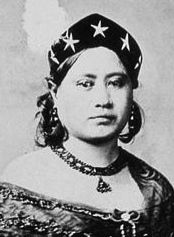 Victoria Kamamalu provided continuity for the office of the Crown pending the appointment and confirmation of Lot Kapuaiwa. Upon his ascension, Kamehameha V refused to take the oath of office until the 1852 Constitution was altered in order to remove those sovereign prerogatives that ran contrary to the principles of a constitutional monarchy, namely articles 45 and 94.
Victoria Kamamalu provided continuity for the office of the Crown pending the appointment and confirmation of Lot Kapuaiwa. Upon his ascension, Kamehameha V refused to take the oath of office until the 1852 Constitution was altered in order to remove those sovereign prerogatives that ran contrary to the principles of a constitutional monarchy, namely articles 45 and 94.
Kamehameha V knew that he had a choice not to take the oath, and that his refusal to take the oath was constitutionally authorized by article 94 of  the Constitution, which provided that the “King, after approving this Constitution, shall take the following oath.” Since he did not approve the Constitution, he was not required to take the oath. Kamehameha V felt the constitutional provisions should be changed since they were a source of great difficulty for his late brother Kamehameha IV, and would continue to be problematic for him and the Legislative Assembly. If he did take the oath, he would have bound himself to the constitution whereby any change or amendment to the constitution was vested solely with the Legislative Assembly. By not taking the oath, he reserved for himself the responsibility of change, which ironically was authorized by the very constitution he sought to amend.
the Constitution, which provided that the “King, after approving this Constitution, shall take the following oath.” Since he did not approve the Constitution, he was not required to take the oath. Kamehameha V felt the constitutional provisions should be changed since they were a source of great difficulty for his late brother Kamehameha IV, and would continue to be problematic for him and the Legislative Assembly. If he did take the oath, he would have bound himself to the constitution whereby any change or amendment to the constitution was vested solely with the Legislative Assembly. By not taking the oath, he reserved for himself the responsibility of change, which ironically was authorized by the very constitution he sought to amend.
1864 Constitution
Kamehameha V and his predecessor recognized articles 45 and 94 as a hindrance to responsible government, and therefore he convened the first Constitutional Convention to draft a new constitution on July 7, 1864. Between July 7 and August 8, 1864, each article in the proposed constitution was read and discussed until the Convention arrived at article 62. The King and Nobles wanted to insert property qualifications for representatives and voters, but the elected delegates refused. After days of debate over article 62, the Convention was deadlocked. As a result, Kamehameha V, in an act of irony, dissolved the convention and exercised his sovereign prerogative under article 45, and he annulled the 1852 constitution and proclaimed a new constitution on August 20, 1864. In other words, Kamehameha V utilized the very provision of absolutism in the 1852 Constitution (Article 45) he sought to remove by a Constitutional Convention, in order to promulgate the 1864 Constitution that the Constitutional Convention could not remove.
In his speech at the opening of the Legislative Assembly of 1864, Kamehameha V explained his action by making specific reference to the “forty-fifth article [that] reserved to the Sovereign the right to conduct personally, in cooperation with the Kuhina Nui (Premier), but without the intervention of a Ministry or the approval of the Legislature, such portions of the public business as he might choose to undertake.” The constitution was not new, but rather the same draft that was before the convention with the exception of the property qualifications for Representatives and voters as embodied in Articles 61 and 62.
Article 61: No person shall be eligible for a Representative of the People, who is insane or an idiot; nor unless he be a male subject of the Kingdom, who shall have arrived at the full age of Twenty-One years—who shall know how to read and write—who shall understand accounts—and shall have been domiciled in the Kingdom for at least three years, the last of which shall be the year immediately preceding his election; and who shall own Real Estate, within the Kingdom, of a clear value, over and above all incumbrances, of at least Five Hundred Dollars; or who shall have an annual income of at least Two Hundred and Fifty Dollars; derived from any property, or some lawful employment.
Article 62: “Every male subject of the Kingdom, who shall have paid his taxes, who shall have attained the age of twenty years, and shall have been domiciled in the Kingdom for one year immediately preceding the election; and shall be possessed of Real Property in this Kingdom, to the value over and above all incumbrances of One Hundred and Fifty Dollars or a Lease-hold property on which the rent is Twenty-five Dollars per year—or of an income of not less than Seventy-five Dollars per year, derived from any property or some lawful employment, and shall know how to read and write, if born since the year 1840, and shall have caused his name to be entered on the list of voters of his District as may be provided by law, shall be entitled to one vote for the Representative or Representatives of that District. Provided, however, that no insane or idiotic person, nor any person who shall have been convicted of any infamous crime within this Kingdom, unless he shall have been pardoned by the King, and by the terms of such pardon have been restored to all the rights of a subject, shall be allowed to vote.”
The office of Premier was also eliminated under the new constitution, which also provided that no act of the Crown was valid unless countersigned by a responsible Minister from the Cabinet, who answered to the Legislative Assembly and could be removed by a vote of a lack of confidence or impeachment proceedings.
The function of the Privy Council was greatly reduced, and a Regency replaced the function of Premier if the King died, leaving a minor heir, who would “administer the Government in the name of the King, and exercise all the powers which are Constitutionally vested in the King.” The Crown was bound to take the oath of office upon ascension to the throne, and the Legislative Assembly had the sole authority to amend or alter the constitution. The Legislative Assembly was now a unicameral body comprised of appointed Nobles and Representatives elected by the people. The constitution also provided that the “Supreme Power of the Kingdom in its exercise, is divided into the Executive, Legislative, and Judicial; these shall always be preserved distinct.” Thus, the separation of powers doctrine was fully enshrined in Hawaiian constitutional governance.
The 1864 Legislative Assembly appointed a special committee comprised of Godfrey Rhodes, John I‘i, and J.W.H. Kauwahi to respond to Kamehameha V’s opening speech of the new legislature. The committee recognized the constitutionality of the King’s prerogative under the former constitution and acknowledged that this “prerogative converted into a right by the terms of the [1852] Constitution, Your Majesty has now parted with, both for Yourself and Successors, and this Assembly thoroughly recognizes the sound judgment by which Your Majesty was actuated in the abandonment of a privilege, which, at some future time might have been productive of untold evil to the nation.”
The Crown was not only authorized by law to do what had been done, but the action of Kamehameha V further limited his own authority under the former constitution. He was the last Monarch to exercise absolutism. No other Monarch could unilaterally change or amend the constitution as Kamehameha V did because the provision of Article 45 was no longer in the 1864 Constitution, and the only way to change or amend the constitution was according to Article 80 which vests that right in the Legislative Assembly together with the Monarch.
In compliance with Article 80, a resolution to amend the constitution was introduced into the Legislative Assembly in the year 1873 when the legislature was called into special session to elect King Lunalilo. When the Legislative Assembly was re-called into special session the following year in 1874 to elect King Kalakaua, the Legislative Assembly also repealed the property qualifications embodied in articles 61 and 62 of the 1864 constitution, but maintained the literacy qualification.
The 1887 Bayonet Constitution: The Beginning of the Insurgency
During the summer of 1887, while the Legislature was out of session, a minority of subjects of the Hawaiian Kingdom and foreign nationals met to organize a revolt and take over the government. The driving motivation was their racist belief that the “native [was] unfit for government and his power must be curtailed.” The local volunteer militia, predominantly United States citizens, called themselves the Hawaiian League, and held a meeting on June 30, 1887 at the Armory building of the Honolulu Rifles. Before this meeting, members of the League had brought large caches of arms from San Francisco and distributed them to other members.
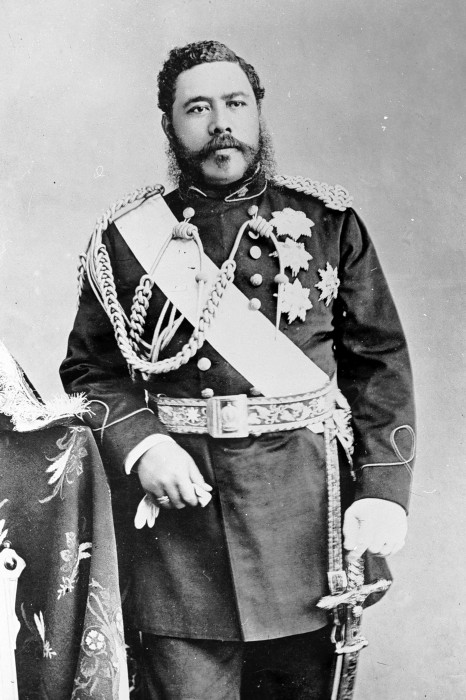 The group made demands on Kalakaua, including an immediate change of the King’s cabinet ministers. Under threat of violence, on July 1, 1887, the King reluctantly agreed to form a new cabinet ministry made up of League members. The true purpose of the League was to neutralize the power of the native vote in order to seize control of the government for their economic gain.
The group made demands on Kalakaua, including an immediate change of the King’s cabinet ministers. Under threat of violence, on July 1, 1887, the King reluctantly agreed to form a new cabinet ministry made up of League members. The true purpose of the League was to neutralize the power of the native vote in order to seize control of the government for their economic gain.
On that same day, the new cabinet comprised of William L. Green as Minister of Finance, Godfrey Brown as Minister of Foreign Affairs, Lorrin A. Thurston as Minister of the Interior, and Clarence W. Ashford as Attorney General, took “an oath to support the Constitution  and Laws, and faithfully and impartially to discharge the duties of his office.” Under strict secrecy and unbeknownst to Kalakaua, the new ministry also invited two members of the Supreme Court, Chief Justice Albert F. Judd and Associate Justice Edward Preston, “to assist in the preparation of a new constitution,” on July 5, 1887, consequently implicating the two highest ranking judicial officers in the revolt. The Chief Justice had the following document acknowledged and signed:
and Laws, and faithfully and impartially to discharge the duties of his office.” Under strict secrecy and unbeknownst to Kalakaua, the new ministry also invited two members of the Supreme Court, Chief Justice Albert F. Judd and Associate Justice Edward Preston, “to assist in the preparation of a new constitution,” on July 5, 1887, consequently implicating the two highest ranking judicial officers in the revolt. The Chief Justice had the following document acknowledged and signed:
“Messrs. S.B. Dole and W.O. Smith and W.A. Kinney, having waited upon the undersigned with a draft of a proposed new Constitution, and having requested us to peruse the same and advise with them as to the form and text of the same, hereby state that we do so under the express understanding that we cannot and do not assent to any change in the present Constitution or to the promulgation of any new Constitution unless made in conformity with the provisions of the Constitution now in force, we having been sworn to maintain that constitution and the laws of the Kingdom and our duty being to maintain such laws, but it being presented to us that the promulgation of a new Constitution is imperatively necessary to maintain peace and order I agree to advise with such gentlemen for the purposes aforesaid.
[Signed]
A.F. Judd
Edward Preston
[Signed]
S.B. Dole
William O. Smith
W.A. Kinney”
Hawaiian constitutional law provided that any proposed change to the constitution must be submitted to the Legislative Assembly, and upon majority agreement, would be deferred to the next legislative session for action. Once the next legislature convened, and the proposed amendment or amendments were “agreed to by two-thirds of all members of the Legislative Assembly, and be approved by the King, such amendment or amendments shall become part of the Constitution of this country.”
As a minority, these individuals had no intent of submitting their draft constitution to the legislature, which was not scheduled to reconvene until 1888. Instead, they embarked on a criminal path of treason. The Penal Code defines treason “to be any plotting or attempt to dethrone or destroy the King, or the levying of war against the King’s government…the same being done by a person owing allegiance to this kingdom. Allegiance is the obedience and fidelity due to the kingdom from those under its protection.” The statute also states when actions:
“constitute the levying of war, the force must be employed or intended to be employed for the dethroning or destruction of the King or in contravention of the laws, or in opposition to the authority of the King’s government, with an intent or for an object affecting some of the branches or departments of said government generally, or affecting the enactment, repeal or enforcement of laws in general, or of some general law; or affecting the people, or the public tranquility generally; in distinction from some special intent or object affecting individuals other than the King, or a particular district.”
The draft constitution was completed on the afternoon of July 5, 1887 and Chief Justice Judd was called in to swear the King to the new constitution in the presence of the Cabinet. But before he signed it, the King asked Judd if he should carry through with his signature. Judd replied, “You must follow the advice of your responsible ministers.” Kalakaua did not know that the highest judicial officer was a co-conspirator. The 1887 Constitution was declared to be the new law of the land. The King’s sister and heir-apparent, Lili‘uokalani, discovered later that her brother had signed the constitution “because he had every assurance, short of actual demonstration, that the conspirators were ripe for revolution, and had taken measures to have him assassinated if he refused.” Charles Gulick, who served as Minister of the Interior from 1883 to 1886, also concluded: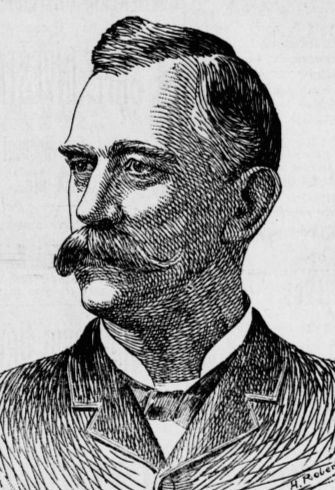
“The ready acquiescence of the King to their demands seriously disconcerted the conspirators, as they had hoped that his refusal would have given them an excuse for deposing him, and a show of resistance a justification for assassinating him. Then everything would have been plain sailing for their little oligarchy, with a sham republican constitution.”
This constitution, known as the Bayonet Constitution, was never submitted to the Legislative Assembly. It was drafted by a select group of twenty individuals and effectively placed control of the Legislature and Cabinet in the hands of individuals who held foreign allegiances.
The constitution maintained a unicameral legislature, but the election of Nobles replaced appointments by the King. Property qualifications were reinstituted for candidates of both Nobles and Representatives. And the cabinet could only be removed by the legislature by a vote of lack of confidence. The new property qualifications ensured that Nobles would be non-natives and would control the elected Representatives.
“For the first time in the history of the country the number of nobles is made equal to the number of representatives. This furnished a veto power over the representatives of the popular vote to the nobles, who were selected by persons mostly holding foreign allegiance, and not subjects of the Kingdom. The election of a single representative by the foreign element gave to it the legislature.”
The resident foreigners of American or European nationality were allowed to cast their votes in the election of the new legislature without renouncing their foreign citizenship and allegiance. The resident foreigners included contract laborers from Portugal’s Madeira and Azores Islands who emigrated to the kingdom after 1878 under labor contracts for the sugar plantations owned by League members. Although few of these workers could read or write, League members utilized this large voting block to neutralize the native vote. According to James Blount, U.S. Special Commissioner assigned to investigate the illegal overthrow of the Hawaiian government by U.S. forces in 1893, he reported to the U.S. Secretary of State Gresham:
“These ignorant laborers were taken before the election from the cane fields in large numbers by the overseer before the proper officer to administer the oath and then carried to the polls and voted according to the will of the plantation manager. Why was this done? In the language of the Chief Justice Judd, “to balance the native vote with the Portuguese vote.” This same purpose is admitted by all persons here. Again, large numbers of Americans, Germans, English, and other foreigners unnaturalized were permitted to vote…”
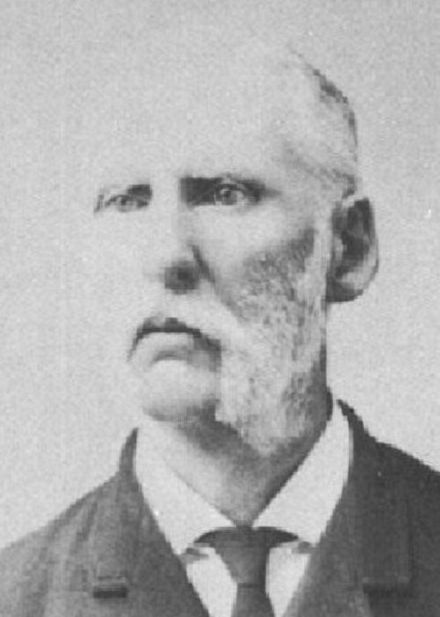 Leading up to the elections on September 12th, there was public outcry. On August 30th 1887, British Consul Wodehouse reported to the British government the new Cabinet’s response: “The new Administration which was dictated by the “Honolulu Rifles” now 300 strong does not give universal satisfaction, and…Attorney General Ashford is reported to have said ‘that they, the Administration, would carry the elections if necessary at the point of the bayonet.’”
Leading up to the elections on September 12th, there was public outcry. On August 30th 1887, British Consul Wodehouse reported to the British government the new Cabinet’s response: “The new Administration which was dictated by the “Honolulu Rifles” now 300 strong does not give universal satisfaction, and…Attorney General Ashford is reported to have said ‘that they, the Administration, would carry the elections if necessary at the point of the bayonet.’”
The election “took place with the foreign population well armed and the troops hostile to the crown and people.” James Blount also concluded that foreign ships anchored in Honolulu harbor during this time “must have restrained the native mind or indeed any mind from a resort to physical force,” and the natives’ “means of resistance was naturally what was left of political power.”
Unlike Kamehameha V, Kalakaua, as the chief executive, did not have the constitutional authority to abrogate and then subsequently promulgate a new constitution without legislative approval. The constitution of 1864 no longer had the sovereign prerogative of Article 45, thus the Crown was limited to faithfully executing Hawaiian law as the country’s chief executive.
Further restraint against sovereign authority was that the enactment of law, whether constitutional or statutory, resided solely with the Legislative Assembly together with the Crown. Article 78 of the 1864 Constitution provided that all “laws now in force in this Kingdom, shall continue and remain in full effect, until altered or repealed by the Legislature; such parts only excepted as are repugnant to this Constitution. All laws heretofore enacted, or that may hereafter be enacted, which are contrary to this Constitution, shall be null and void.”
Throughout the revolt, there was active opposition to the minority of insurgents by the Hawaiian citizenry that ranged from peaceful organized resistance to unsuccessful armed attacks. On November 22, 1888, the Hawaiian Political Association (Hui Kalai‘aina) was established with the purpose of “restoration of the constitutional system existing before June 30, 1887.” For the next five years this organization was the most persistent and influential in maintaining that the constitution of 1864, as amended, was the legal constitution of the country.
In June 1889, the Liberal Patriotic Association, a secret society, was formed “to restore the former system of government and the former rights of the king.” The following month on July 30th, the organization’s leader, Robert Wilcox, led an unsuccessful armed attack with 80 men against the cabinet ministry on the grounds of ‘Iolani Palace. Wilcox was initially indicted for treason, “but it became clear that…no native jury would convict him of that crime. The treason charge was dropped and he was brought to trial on an indictment for conspiracy.” He was tried by a native jury, which found him not guilty. Their verdict represented the native sentiment throughout the kingdom, representing eighty-five percent of the Hawaiian citizenry. In a dispatch to U.S. Secretary of State James Blaine on November 4, 1889, U.S. Minister John Stevens from the American legation in Honolulu acknowledged the significance of the verdict:
“This preponderance of native opinion in favor of Wilcox, as expressed by the native jury, fairly represented the popular native sentiment throughout these islands in regard to his effort to overthrow the present ministry and to change the constitution of 1887, so as to restore to the King the power he possessed under the former constitution.”
There is a strong argument that the actions taken by Wilcox and other members of the Liberal Patriotic Association was a lawful but unsuccessful citizen’s arrest, and not a counter-revolt as characterized by the cabinet ministry. In theory, a counter-revolt can only take place if the original revolt was successful. But if the original revolt was not successful, or in other words, the country was still in a state of revolt or unlawfulness, any action taken to apprehend or to hold accountable the original perpetrators is not a violation of the law, but rather an enforcement of the law. Under the common law, every private “person that is present when any felony is committed, is bound by the law to arrest the felon.”
According to the Hawaiian Penal Code, the “terms felony and crime, are…synonymous, and mean such offenses as are punishable with death,” which makes treason a felony. Therefore, Wilcox’s attack should be considered a failed attempt to apprehend insurgents serving in the cabinet ministry. Wilcox reinforced the theory of citizen’s arrest when he lashed out at Lorrin Thurston on the floor of the Legislative Assembly in 1890. Thurston, one of the organizers of the 1887 revolt, was an insurgent who served at the time as the Minister of the Interior.
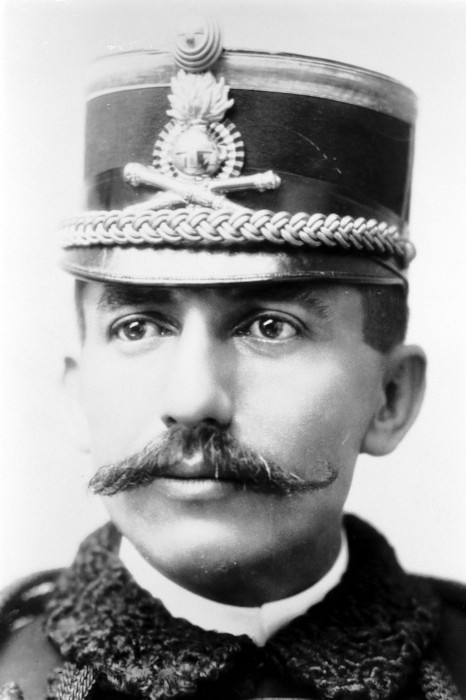 “Yes, Mr. Minister, with your heart ever full of venom for the people and country which nurtured you and your fathers, I say, you and such as you are the murderers. The murderers and the blood of the murdered should be placed where it belongs, with those who without warrant opened fire upon natives trying to secure a hearing of their grievances before their King.…Our object was to restore a portion of the rights taken away by force of arms from the King.… Before the Living God, I never felt this action of mine to be a rebellion against my mother land, her independence, and her rights, but (an act) for the support and strengthening of the rights of my beloved race, the rights of liberty, the rights of the Throne and the good of the beautiful flag of Hawai‘i; and if I die as a result of this my deed, it is a death of which I will be most proud, and I have hope I will never lack the help of the Heavens until all the rights are returned which have been snatched by the self-serving migrants of America.”
“Yes, Mr. Minister, with your heart ever full of venom for the people and country which nurtured you and your fathers, I say, you and such as you are the murderers. The murderers and the blood of the murdered should be placed where it belongs, with those who without warrant opened fire upon natives trying to secure a hearing of their grievances before their King.…Our object was to restore a portion of the rights taken away by force of arms from the King.… Before the Living God, I never felt this action of mine to be a rebellion against my mother land, her independence, and her rights, but (an act) for the support and strengthening of the rights of my beloved race, the rights of liberty, the rights of the Throne and the good of the beautiful flag of Hawai‘i; and if I die as a result of this my deed, it is a death of which I will be most proud, and I have hope I will never lack the help of the Heavens until all the rights are returned which have been snatched by the self-serving migrants of America.”
At the close of this tumultuous 1890 legislative session, where Hawaiian subjects stated their objections, the King’s health had deteriorated. On November 25th he departed for San Francisco on board the USS Charleston for a period of respite and designated Lili‘uokalani, his heir apparent, as Regent during his absence. King Kalakaua died in San Francisco on January 20, 1891, and his body returned to Honolulu on board the USS Charleston on the 29th.
 In a meeting of the Privy Council that afternoon, Lili‘uokalani took the oath of office, where she swore “in the presence of Almighty God, to maintain the Constitution of the Kingdom whole and inviolate, and to govern in conformity therewith.” Chief Justice Albert F. Judd administered the oath and Lili‘uokalani was thereafter proclaimed Queen. The oath did not state that she maintain the 1887 Bayonet Constitution, but rather “the Constitution.” The Bayonet Constitution was never ratified by the Legislative Assembly, so therefore it was never a constitution to begin with. The 1864 Constitution remained the constitution of the country.
In a meeting of the Privy Council that afternoon, Lili‘uokalani took the oath of office, where she swore “in the presence of Almighty God, to maintain the Constitution of the Kingdom whole and inviolate, and to govern in conformity therewith.” Chief Justice Albert F. Judd administered the oath and Lili‘uokalani was thereafter proclaimed Queen. The oath did not state that she maintain the 1887 Bayonet Constitution, but rather “the Constitution.” The Bayonet Constitution was never ratified by the Legislative Assembly, so therefore it was never a constitution to begin with. The 1864 Constitution remained the constitution of the country.
The legislative and judicial branches of government had been compromised by the revolt. The Nobles became an elected body of men whose allegiance was to the foreign population, and three of the justices of the Supreme Court, including the Chief Justice, participated in the revolt by drafting the 1887 constitution. The Queen was prevented from legally confirming her niece, Ka‘iulani Cleghorn, as heir-apparent, because the Nobles had not been in the Legislative Assembly since 1887. Article 22 of the 1864 Constitution provides that “the successor shall be the person whom the Sovereign shall appoint with the consent of the Nobles, and publicly proclaim as such during the King’s life.”
Nevertheless, Ka‘iulani, by nomination of the Queen, could be considered a de facto heir-apparent, subject to confirmation by the Nobles when they reconvened. Despite the ongoing political turmoil in the Hawaiian Kingdom, preparations were being made to celebrate fifty years of Hawaiian independence since the Anglo-French proclamation of November 28th 1843. The year 1893 marked the fiftieth anniversary of Hawai‘i as an internationally recognized independent and sovereign State.
Star-Advertiser Front Page: Memo implies nation effort leads to war crimes
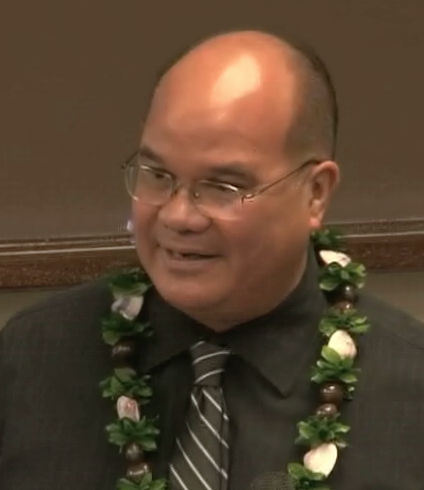 In today’s Honolulu Star-Advertiser newspaper, reporter Rob Perez centers his story on a 44-page memorandum authored by Dr. David Keanu Sai, political scientist, under contract by the CEO of the Office of Hawaiian Affairs (OHA), Dr. Kamana‘opono Crabbe. Perez reports, “The state Office of Hawaiian Affairs administrator paid a controversial political scientist $25,000 to write a memo that calls into question the validity of OHA’s nation-building effort, even raising the question of whether the office’s trustees are committing war crimes by pursuing it.”
In today’s Honolulu Star-Advertiser newspaper, reporter Rob Perez centers his story on a 44-page memorandum authored by Dr. David Keanu Sai, political scientist, under contract by the CEO of the Office of Hawaiian Affairs (OHA), Dr. Kamana‘opono Crabbe. Perez reports, “The state Office of Hawaiian Affairs administrator paid a controversial political scientist $25,000 to write a memo that calls into question the validity of OHA’s nation-building effort, even raising the question of whether the office’s trustees are committing war crimes by pursuing it.”
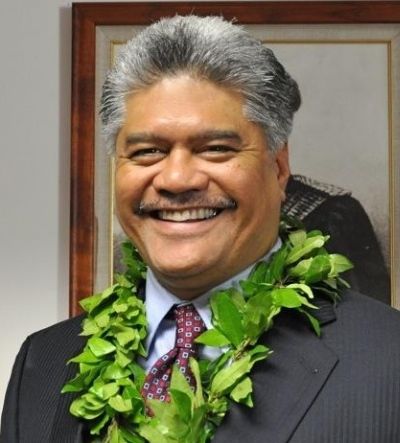 The article draws attention to the memo, but it may give the impression that Dr. Crabbe was not authorized to contract the services of Dr. Sai without OHA Trustees approval as stated by Trustee Peter Apo. Perez, however, correctly stated, if you keep reading, “Crabbe, OHA’s chief executive since January 2012, has the authority to spend up to $25,000 without getting prior board approval.” Perez reported: “It was part of a follow-up due diligence effort so I could protect trustees and OHA leadership of any risks that might be incurred,” Crabbe wrote. “I also provided Dr. Sai’s memo to trustees so they could use it in their deliberations. I believe we should consider all points of view, even controversial ones, to fully understand this complex issue.”
The article draws attention to the memo, but it may give the impression that Dr. Crabbe was not authorized to contract the services of Dr. Sai without OHA Trustees approval as stated by Trustee Peter Apo. Perez, however, correctly stated, if you keep reading, “Crabbe, OHA’s chief executive since January 2012, has the authority to spend up to $25,000 without getting prior board approval.” Perez reported: “It was part of a follow-up due diligence effort so I could protect trustees and OHA leadership of any risks that might be incurred,” Crabbe wrote. “I also provided Dr. Sai’s memo to trustees so they could use it in their deliberations. I believe we should consider all points of view, even controversial ones, to fully understand this complex issue.”
Dr. Crabbe was seeking to have the Trustees, after receiving a copy of the memo, to meet with Dr. Sai in a Board meeting to ask questions regarding the memo, but he was unsuccessful. Instead, you get uninformed opinions made by Chair Trustee Collette Machado and Apo attempting to paint the picture that there was some collusion going on between Dr. Crabbe and Dr. Sai. This was clearly not the case as Perez reported.
Perez also mentions another contract Dr. Sai has with OHA entered in 2009 for $70,000.00 to complete a book on land titles to be academically published by the University of Hawai‘i Press. Perez reported, “OHA recently agreed to an extension allowing him more time to work on the manuscript and has withheld a final payment of $5,000 until the book is published. Sai’s initial research led him in the 1990s to co-found Perfect Title Co., which cited Hawaiian kingdom law to contend that existing land titles in Hawaii were defective. Sai said his book will detail how the title problem can be fixed.” This book contract with OHA occurred before Dr. Crabbe was at OHA.
The article also mentions that Dr. Sai was convicted of a felony, attempted theft, but failed to explain what the subject of the theft was, therefore implying Dr. Sai was convicted of stealing money from clients of Perfect Title Company. The crime Dr. Sai was alleged to have committed was not the attempted theft of money, but rather the attempted theft of land by doing title reports and providing the remedy to the defect in title under Hawaiian law. When applying the larceny (theft) law it can only apply to personal property, which is moveable property, as opposed to real property (real estate), which is immovable. This distinction is clearly stated in the definition of larceny where the property has to be “carried away” or “attempted to carried away.”
According to the United States Department of Justice, Federal Bureau of Investigation (FBI), larceny-theft is “the unlawful taking, carrying, leading, or riding away of property from the possession or constructive possession of another. Examples are thefts of bicycles, motor vehicle parts and accessories, shoplifting, pocket-picking, or the stealing of any property or article that is not taken by force and violence or by fraud. Attempted larcenies are included.” A home, being real property, cannot be carried away by doing a title search. Dr. Sai and two clients of Perfect Title Company are the only individuals in the world to have been convicted of attempting to steal a home through a title report, which is not theft. If there was to be any allegation of a crime, it should have been conspiracy and/or fraud. That was not the case because the title report by Perfect Title Company was irrefutable.
As egregious as it sounds, it is not only used in an attempt to disparage the reputation of Dr. Sai, but it is also a war crime by depriving Dr. Sai a fair and regular trial, especially on a manufactured charge of a crime that doesn’t legally exist. This was the subject of a federal lawsuit Dr. Sai filed in a United States District Court in Washington, D.C., Sai v. Clinton, et. al., in 2010. The Federal judge dismissed the case stating it was a political question, which is an option U.S. judges can use to say it belongs to the executive or legislative branches of government and not the judicial branch. The complaint was not dismissed because it was a frivolous claim.
In his interview with Perez, Dr. Sai brought to his attention that $25,000.00 to do a memorandum needs to be kept in context. A prior memo contracted by OHA with an attorney that centered on strategies toward federal recognition cost $75,000.00. Dr. Sai also told Perez that Norma Wong, a consultant to Kana‘iolowalu, and close confidant and advisor to former Governor John Waihe‘e, III, Chair of the Roll Commission, was paid two increments of $250,000.00 a year for a total of $500,000.00. Chair Waihe‘e also contracted Dennis Dwyer for a total of $1.3 million dollars to be Kana‘iolowalu’s federal lobbyist in Washington, D.C. Dwyer was also contracted by the Honolulu Rail Project’s HART to be its federal lobbyist and was paid $1.43 million dollars from 2007 to 2013. Dr. Sai also told Perez that Clyde Namuo, who was also the former CEO for OHA before Dr. Crabbe, was simultaneously collecting a full-time salary as Kana‘iolowalu’s Executive Director while he was also collecting a full-time salary as director for the Polynesian Voyaging Society.
We have provided a link to Dr. Sai’s memorandum in order to provide the public with access to the information that was at the center of the story. The public can now read what the Trustees have in their possession and be informed by the diligent research of a political scientist and not a politician. In the memo, Dr. Sai did not solely focus on federal recognition, but also recommended that OHA continue its services to the Native (aboriginal) Hawaiian community, under the doctrine of necessity, so long as it does not conflict with Hawaiian Kingdom law and the international laws of occupation.
Trustees Apo and Machado would be better served by focusing on the existence or non existence of the Hawaiian Kingdom as a country under international law first and whether or not war crimes have been committed. To render Dr. Sai’s memorandum moot, the Trustees should focus on the Department of Justice, Office of Legal Counsel, to rebut the analysis and provide evidence that the Hawaiian Kingdom was extinguished under international law, which was the subject of Dr. Crabbe’s letter to Secretary of State Kerry. If the Hawaiian Kingdom does not exist under international law and Hawai‘i is the 50th State of the American Union, then the U.S. Department of Justice should have no hesitation providing the evidence in a timely manner. The problem, however, is it hasn’t, which only reinforces the presumption of continuity of the Hawaiian Kingdom.
This is a very serious issue and this subject should not be taken lightly.
The Three Estates of the Hawaiian Kingdom
The government of the Hawaiian Kingdom is a constitutional and limited monarchy comprised of three Estates: the Monarch, Nobles and the People. An Estate is defined as a “political class.” All three political classes work in concert and provides for the legal basis of the government and its authority. Article 45 of the 1864 Hawaiian constitution, provides: “The Legislative power of the Three Estates of this Kingdom is vested in the King, and the Legislative Assembly; which Assembly shall consist of the Nobles appointed by the King, and of the Representatives of the People, sitting together.”
This provision is further elaborated under §768, Hawaiian Civil Code (Compiled Laws, 1884), “The Legislative Department of this Kingdom is composed of the King, the House of Nobles, and the House of Representatives, each of whom has a negative on the other, and in whom is vested full power to make all manner of wholesome laws, as they shall judge for the welfare of the nation, and for the necessary support and defense of good government, provided the same is not repugnant or contrary to the Constitution.” As each Estate has a negative on each other, no law can be passed without all three Estates agreeing.
According to Hawaiian law “No person shall ever sit upon the Throne, who has been convicted of any infamous crime, or who is insane, or an idiot (Article 25, 1864 Constitution),” which, by extension, extends to the Nobles whereby “The King appoints the members of the House of Nobles, who hold their seats during life, unless in case of resignation, subject, however, to punishment for disorderly behavior. The number of members of the House of Nobles shall not exceed thirty (§771, Compiled Laws).”
Representatives of the People shall be Hawaiian subjects or denizens “who shall have arrived at the full age of twenty-five years, who shall know how to read and write; who shall understand accounts, and who shall have resided in the Kingdom for at least one year immediately preceding his election; provided always, that no person who is insane, or an idiot, or who shall at any time have been convicted of theft, bribery, perjury, forgery, embezzlement, polygamy, or other high crime or misdemeanor, shall ever hold seat as Representative of the people (§778, Compiled Laws).”
The number of the Representatives of the people in the Legislature shall be twenty-eight: eight for the Island of Hawai‘i (one for the district of North Kona, one for the district of South Kona, One for the district of Ka‘u, one for the district Puna, two for the district of Hilo, one for the district Hamakua, one for the district of Kohala); seven for the Island of Maui (two for the districts of Lahaina, Olowalu, Ukumehame, and Kaho‘olawe, one for the districts of Kahakuloa and Ka‘anapali, one for the districts of Waihe‘e and Honuaula, one for the districts of Kahikinui and Ko‘olau, one for the districts of Hamakualoa and Kula); two for the Islands of Molokai and Lanai; eight for the Island of O‘ahu (four for the districts of Honolulu that extends from Maunalua to Moanalua, one for the districts of Ewa and Waianae, one for the district of Waialua, one for the district of Ko‘olauloa, and one for the district of Ko‘olaupoko); and three for the island of Kaua‘i (one for the districts of Waimea, Nualolo, Hanapepe and the Island of Ni‘ihau, one for the districts of Puna, Wahiawa and Wailua, and one for the districts of Hanalei, Kapa‘a and ‘Awa‘awapuhi) (§780, Compiled Laws).
Electors of the Representatives shall be Hawaiian subjects or denizens “who shall have paid his taxes, who shall have attained the age of twenty years, and shall have been domiciled in the Kingdom for one year immediately preceding the election, and shall know how to read and write, if born since the year 1840, and shall have caused his name to be entered on the list of voters of his district…shall be entitled to one vote for Representative or Representatives of that district; provided, however, that no insane or idiotic person, or any person who shall have been convicted of any infamous crime within this Kingdom unless he shall have been pardoned by the King, and by the terms, and by the terms of such pardon have been restored to all the rights of a subject, shall be allowed to vote (p. 222, Compiled Laws).”
The Estate of the Crown
 The first constitution of the Hawaiian Kingdom was promulgated in 1840 by King Kamehameha III, which was superseded by the 1852 Constitution. Article 25 of the 1852 Constitution provided: “The crown is hereby permanently confirmed to His Majesty Kamehameha III. during his life, and to his successor. The successor shall be the person whom the King and the House of Nobles shall appoint and publicly
The first constitution of the Hawaiian Kingdom was promulgated in 1840 by King Kamehameha III, which was superseded by the 1852 Constitution. Article 25 of the 1852 Constitution provided: “The crown is hereby permanently confirmed to His Majesty Kamehameha III. during his life, and to his successor. The successor shall be the person whom the King and the House of Nobles shall appoint and publicly 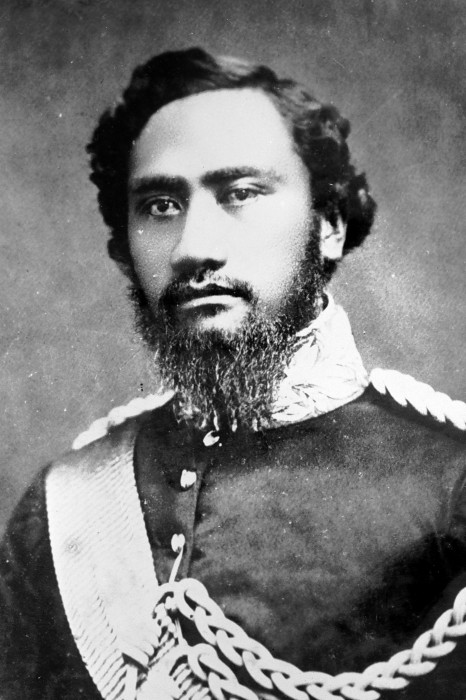 proclaim as such, during the King’s life; but should there be no such appointment and proclamation, then the successor shall be chosen by the House of Nobles and the House of Representatives in joint ballot.” Kamehameha III proclaimed his adopted son, Alexander Liholiho, to be his heir apparent after receiving confirmation from the Nobles in 1853. Alexander ascended to the Throne upon the death of King Kamehameha III on December 15, 1854.
proclaim as such, during the King’s life; but should there be no such appointment and proclamation, then the successor shall be chosen by the House of Nobles and the House of Representatives in joint ballot.” Kamehameha III proclaimed his adopted son, Alexander Liholiho, to be his heir apparent after receiving confirmation from the Nobles in 1853. Alexander ascended to the Throne upon the death of King Kamehameha III on December 15, 1854.
 King Kamehameha V ascended to the Throne through the process of appointment by the Premier (Kuhina Nui) Victoria Kamamalu, and confirmation by the Nobles in 1863, because Kamehameha IV had no surviving children. His son and heir, Prince Albert Kamehameha, died at the age of four
King Kamehameha V ascended to the Throne through the process of appointment by the Premier (Kuhina Nui) Victoria Kamamalu, and confirmation by the Nobles in 1863, because Kamehameha IV had no surviving children. His son and heir, Prince Albert Kamehameha, died at the age of four  on August 27, 1862. Since the young Prince’s death, Kamehameha IV did not appoint a successor before he died on November 30, 1863. According to the 1852 Constitution, Article 47 provided, “Whenever the throne shall become vacant by reason of the King’s death…the Kuhina Nui, for the time being, shall…perform all the duties incumbent on the King, and shall have and exercise all the powers, which by this Constitution are vested in the King.”
on August 27, 1862. Since the young Prince’s death, Kamehameha IV did not appoint a successor before he died on November 30, 1863. According to the 1852 Constitution, Article 47 provided, “Whenever the throne shall become vacant by reason of the King’s death…the Kuhina Nui, for the time being, shall…perform all the duties incumbent on the King, and shall have and exercise all the powers, which by this Constitution are vested in the King.”
In 1864, a new constitution was promulgated by King Kamehameha V, and Article 22 of the 1864 Constitution provides that, “The Crown is hereby permanently confirmed to His Majesty Kamehameha V. and to the Heirs of His body lawfully begotten, and to their lawful Descendants in a direct line; failing whom, the Crown shall descend to Her Royal Highness the Princess Victoria Kamamalu Kaahumanu, and the heirs of her body, lawfully begotten, and their lawful descendants in a direct line. The Succession shall be to the senior male child, and to the heirs of his body; failing a male child, the succession shall be to the senior female child, and to the heirs of her body.” Princess Kamamalu died on May 29, 1866 without any lineal descendants, leaving the successors to the Throne solely with King Kamehameha V.
Since Kamehameha V had no children, Article 22 of the 1864 Constitution provides that a “successor shall be the person whom the Sovereign shall appoint with the consent of the Nobles, and publicly proclaim as such during the King’s life; but should there be no such appointment and proclamation, and the Throne should become vacant, then the Cabinet Council, immediately after the occurring of such vacancy, shall cause a meeting of the Legislative Assembly, who shall elect by ballot some native Ali‘i of the Kingdom as Successor to the Throne.” The Cabinet Council replaced the function of the Premier (Kuhina Nui) under the former constitution, whose office was repealed by the 1864 Constitution, and according to Article 33 would serve as a Council of Regency.
On December 11, 1872, Kamehameha V died without children and he did not appoint a successor. Kamehameha V’s Cabinet, as a Council of Regency, convened the Legislative Assembly in special session on January 8, 1873. A regent is a person or persons who serve in the absence of a monarch. In their speech to the Legislature, the Council stated:
“His late Majesty did not appoint any successor in the mode set forth in the Constitution, with the consent of the Nobles or make Proclamation thereof during his life. There having been no such appointment or Proclamation, the Throne became vacant, and the Cabinet Council immediately thereupon considered the form of the Constitution in such case made and provided, and Ordered—That a meeting of the Legislative Assembly be caused to be holden at the Court House in Honolulu, on Wednesday which will be the eighth day of January, A.D. 1873, at 12 o’clock noon; and of this order all Members of the Legislative Assembly will take notice and govern themselves accordingly. By virtue of this Order you have been assembled, to elect by ballot, some native Ali‘i of this Kingdom as Successor to the Throne. Your present authority is limited to this duty, but the newly elected Sovereign may require your services after his accession.”
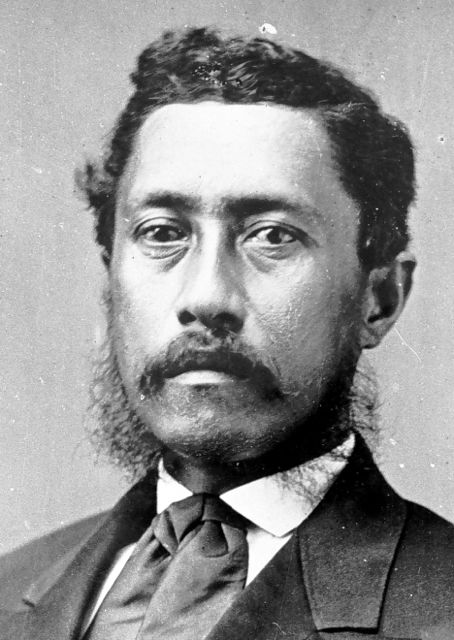 On that day the Legislature elected Lunalilo as King. From December 11, 1872 to January 8, 1873, the Kingdom was headed by a Council of Regency. Article 33 of the 1864 Constitution provides that “the Cabinet Council at the time of such decease shall be a Council of Regency…who shall administer the Government in the name of the King, and exercise all the Powers which are Constitutionally vested in the King.”
On that day the Legislature elected Lunalilo as King. From December 11, 1872 to January 8, 1873, the Kingdom was headed by a Council of Regency. Article 33 of the 1864 Constitution provides that “the Cabinet Council at the time of such decease shall be a Council of Regency…who shall administer the Government in the name of the King, and exercise all the Powers which are Constitutionally vested in the King.”
 The Legislative Assembly convened again in special session on February 12, 1874 and elected King Kalakaua after Lunalilo, who died without children, failed to appoint a successor. Upon ascension to the Throne, King Kalakaua appointed his brother Prince William Pitt Leleiohoku as his heir apparent and received confirmation from the Nobles. Leleiohoku died April 10, 1877, which prompted
The Legislative Assembly convened again in special session on February 12, 1874 and elected King Kalakaua after Lunalilo, who died without children, failed to appoint a successor. Upon ascension to the Throne, King Kalakaua appointed his brother Prince William Pitt Leleiohoku as his heir apparent and received confirmation from the Nobles. Leleiohoku died April 10, 1877, which prompted 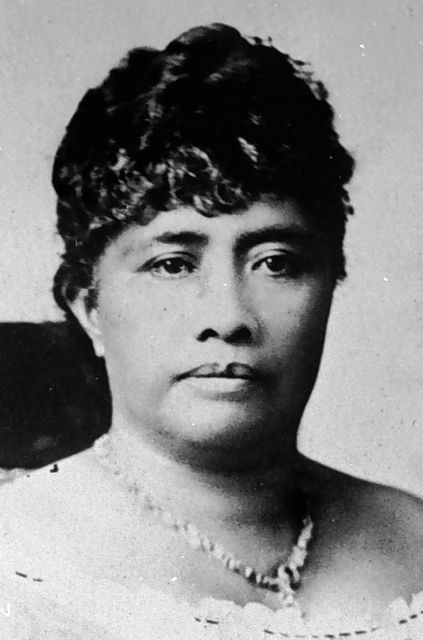 Kalakaua to immediately appoint his sister on the same day, Princess Lili‘uokalani, as his heir apparent and he received confirmation from the Nobles. An heir apparent is a person who is first in line of succession to the Throne according to Hawaiian law and cannot be displaced. An heir presumptive, however, is the person, male or female, entitled to succeed to the Throne, but can be replaced by an heir apparent pronounced according to Hawaiian law.
Kalakaua to immediately appoint his sister on the same day, Princess Lili‘uokalani, as his heir apparent and he received confirmation from the Nobles. An heir apparent is a person who is first in line of succession to the Throne according to Hawaiian law and cannot be displaced. An heir presumptive, however, is the person, male or female, entitled to succeed to the Throne, but can be replaced by an heir apparent pronounced according to Hawaiian law.
When the Legislative Assembly elected King Kalakaua in 1874, a new Stirps had effectively replaced the former Stirps, being the Kamehameha dynasty, with the Keawe-a-Heulu dynasty. Although Lunalilo was an elected King, he was of the Kamehameha dynasty, through Kamehameha’s father, Keoua. Stirps is a direct “line descending from a common ancestor,” and applies to monarchical dynasties. The Stirps for the Kamehameha Dynasty was a direct line from Kamehameha with Keopuolani, being the highest ranking of his wives. Lunalilo was not a direct descendant of Kamehameha, but a direct descendant of Kamehameha’s father, Keoua, whose son, Kalaimamahu, was Kamehameha’s half-brother.
Keawe-a-Heulu was one of the four counselor chiefs to Kamehameha I when the 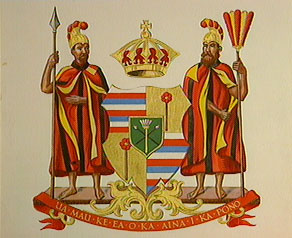 islands were consolidated under one kingdom. The other three counselor chiefs were Ke‘eaumoku, Kamanawa and Kame‘eiamoku. Ke‘eaumoku was the father of Ka‘ahumanu, one of Kamehameha’s wives and who later served as Prime Minister after Kamehameha’s death in 1819. Kamanawa and Kame‘eiamoku were brothers and are also represented in the Hawaiian Kingdom’s coat of arms.
islands were consolidated under one kingdom. The other three counselor chiefs were Ke‘eaumoku, Kamanawa and Kame‘eiamoku. Ke‘eaumoku was the father of Ka‘ahumanu, one of Kamehameha’s wives and who later served as Prime Minister after Kamehameha’s death in 1819. Kamanawa and Kame‘eiamoku were brothers and are also represented in the Hawaiian Kingdom’s coat of arms.
The Kamehameha dynasty also included the descendants of Kamehameha’s other wives, other than Keopuolani who was the mother of Kamehameha II and III, and the young Princess Nahienaena. These wives and children included: Peleuli who had Maheha Kapulikoliko, Kahoanoku Kina‘u, Kaiko‘olani and Kiliwehi; Kaheiheimalie who had Kamamalu and Kina‘u, who was the mother of Kamehameha IV and V, and Premier Victoria Kamamalu.
In 1883, the Keawe-a-Heulu Stirps was formally declared at the Coronation of King Kalakaua and Queen Kapi‘olani. Princess Lili‘uokalani as the heir apparent, and the heirs presumptive, being Princess Virginia Kapo‘oloku Po‘omaikelani, Princess Kinoiki, Princess Victoria Kawekiu Kai‘ulani Lunalilo Kalaninuiahilapalapa, Prince David Kawananakoa, Prince Edward Abnel Keli‘iahonui, and Prince Jonah Kuhio Kalaniana‘ole comprised the new royal lineage.
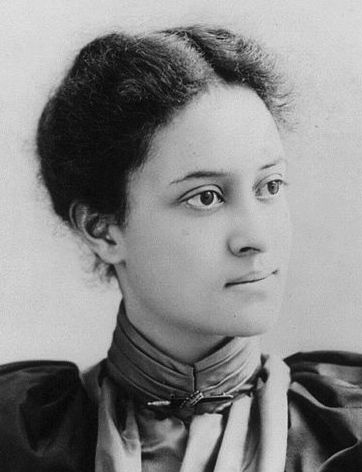 Queen Lili‘uokalani appointed Princess Ka‘iulani as her heir apparent in 1891, but was unable to get confirmation by the Nobles because they were prevented from entering the Legislative Assembly as a result of the so-called 1887 bayonet constitution that began the insurgency. In 1917, Queen Lili‘uokalani died with no such appointment or Proclamation leaving the Throne vacant. After the Queen’s death, only Prince Kuhio was left of the heirs presumptive. All the rest had died. Of the heirs presumptive, only Prince David Kawananakoa died with lineal descendants, but these lineal descendants did not inherit the title of heirs presumptive because they were not proclaimed as such by a reigning Monarch, as King Kalakaua did by proclamation in 1883. While these lineal descendants have no claim to the Throne, they are part of the Estate of the Ali‘i (Chiefs).
Queen Lili‘uokalani appointed Princess Ka‘iulani as her heir apparent in 1891, but was unable to get confirmation by the Nobles because they were prevented from entering the Legislative Assembly as a result of the so-called 1887 bayonet constitution that began the insurgency. In 1917, Queen Lili‘uokalani died with no such appointment or Proclamation leaving the Throne vacant. After the Queen’s death, only Prince Kuhio was left of the heirs presumptive. All the rest had died. Of the heirs presumptive, only Prince David Kawananakoa died with lineal descendants, but these lineal descendants did not inherit the title of heirs presumptive because they were not proclaimed as such by a reigning Monarch, as King Kalakaua did by proclamation in 1883. While these lineal descendants have no claim to the Throne, they are part of the Estate of the Ali‘i (Chiefs).
Currently, there are pretenders to the Estate of the Crown that have claimed to be Kings, Princes or Princesses. Some claims are well known, while others are not, but all claims to the Throne have no basis in Hawaiian law because Her late Majesty Queen Lili‘uokalani did not appoint and thereafter proclaim her successor in accordance with the law as it was done in the past. The titles of Prince and Princess are not hereditary titles, but have a direct correlation to the reigning Monarch, as either being an heir apparent or heirs presumptive. In other words, an individual cannot claim to be a prince or princess without a sitting Monarch for the realm.
The Estate of Nobles (Chiefs)
The political class of Ali‘i is an integral component of the Hawaiian Kingdom and its government and has its origin deeply rooted in Polynesian society. The entire land system of the Kingdom that continues to exist today is grounded and based on actions taken by the Ali‘i such as the granting of Royal Patents, Land Commission Awards, and the Great Land Division (Mahele) between the Government and Chiefs, which also set the terms of division between both the Government and Chiefs and native tenants desiring to get a fee-simple title to their lands.
On August 9, 1880, the Hawaiian Legislature enacted “An Act to Perpetuate the Genealogy of the Chiefs of Hawaii.”
According to the Rules of the Board, their principle duties are: “1. To gather, revise, correct and record the Genealogy of Chiefs. 2. To gather, revise, correct and record all published and unpublished Ancient Hawaiian History. 3. To gather, revise, correct and record all published and unpublished Meles (Songs), and also to ascertain the object and the spirit of the Meles, the age and the History of the period when composed and to note the same on the Record Book. 4. To record all the tabu customs of the Mois (Kings) and Chiefs.”
In its Report in 1884, the Board stated it was examining copies of genealogical books by Kamokuiki, Kaoo, Kaunahi, Unauna, Hakaleleponi, Piianaia, Kalaualu and David Malo, and that the “Board has not entered into revision of these books and those written by foreign historians as the time has been taken up mostly in attesting the genealogy of those that have applied to have their genealogy established.” The Board also reported, that it “has avoided entering into controversies with the genealogical discussions that have been going on for a year or more in the local Hawaiian newspapers, as these discussions have been more or less conducted in a partisan spirit instead of on scientific principles. They loose the merit of usefulness by the hostilities assumed by the contending writers.”
On July 5, 1887, the newly appointed Cabinet Council and two members of the Supreme Court committed the high crime of treason by coercing King Kalakaua to sign a new constitution under threat of assassination. This so-called constitution came to be known as the Bayonet Constitution and was never submitted to the Legislative Assembly for approval, which is required under law. Hawaiian constitutional law provides that any proposed change to the constitution must be submitted to the Legislative Assembly, and upon majority agreement, would be deferred to the next legislative session for action. Once the next legislature convened, and the proposed amendment or amendments were “agreed to by two-thirds of all members of the Legislative Assembly, and be approved by the King, such amendment or amendments shall become part of the Constitution of this country (Article 80, 1864 Constitution).”
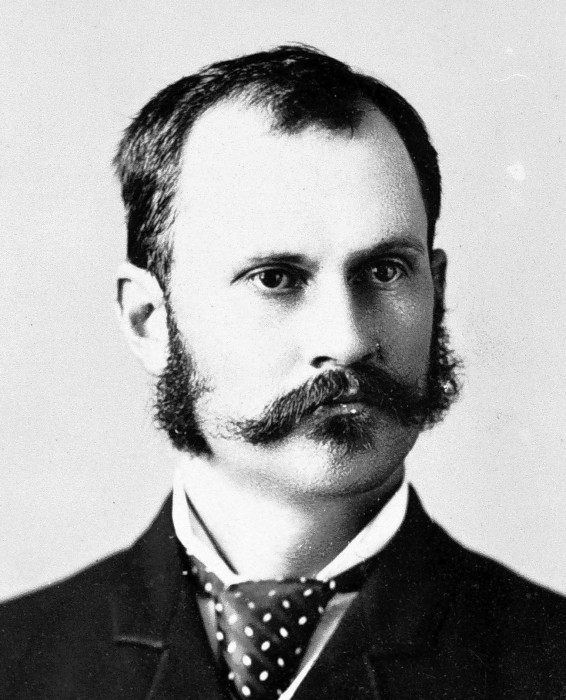 This so-called constitution was drafted by a select group of twenty individuals and effectively placed control of the Legislature and Cabinet in the hands of individuals who held foreign allegiances, which led to the illegal overthrow of the Hawaiian government by the United States of America. The leader of this insurgency, Lorrin Thruston, was the Minister of the Interior, and he refused to fund the Board of Genealogists
This so-called constitution was drafted by a select group of twenty individuals and effectively placed control of the Legislature and Cabinet in the hands of individuals who held foreign allegiances, which led to the illegal overthrow of the Hawaiian government by the United States of America. The leader of this insurgency, Lorrin Thruston, was the Minister of the Interior, and he refused to fund the Board of Genealogists 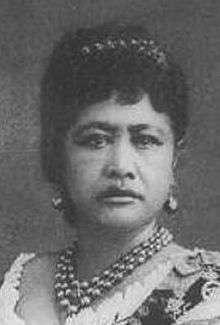 as required by law. In a letter to Her Royal Highness Princess Po‘omaikelani, President of the Genealogical Board, dated July 29, 1887, Thurston writes, “I beg to acknowledge receipt of your communication of the 27th inst. in which you state the labors of the board need not be suspended because the appropriation cannot be paid. There can, of course, be no objection to a continuation of the work of the Board of Genealogy so long as it is carried out without expense to the Government.”
as required by law. In a letter to Her Royal Highness Princess Po‘omaikelani, President of the Genealogical Board, dated July 29, 1887, Thurston writes, “I beg to acknowledge receipt of your communication of the 27th inst. in which you state the labors of the board need not be suspended because the appropriation cannot be paid. There can, of course, be no objection to a continuation of the work of the Board of Genealogy so long as it is carried out without expense to the Government.”
Despite the lack of government funding and the illegal overthrow of the Hawaiian Kingdom government, the Board continued their work to compile the genealogies of Hawaiian Chiefs (Mo‘okua‘auhau Ali‘i) that were eventually published in the Ka Maka‘ainana newspaper in the year 1896.
The acting Government is providing these publications, which are in the Hawaiian language, to the public at large with a link to the original publication in PDF by date of the publication. The names of Hawaiian Chiefs below are printed as they are written in the published genealogies, which did not have any diacritical markers such as the ‘okina or kahako. The English translations of these publications can be drawn from Edith Kawelohea McKinzie and Ishmael W. Stagner, II, Hawaiian Genealogies, vol. 1. A basic glossary of terms that can be used to understand the published genealogies are:
“k” is short for kane (male)
“w” is short for wahine (female)
noho (to live with, but used to mean the same as marriage)
mare (married)
a‘ohe pua (no lineal descendants)
kuamo‘o (lineage)
kuauhau (genealogy)
loa‘a (had)
mo‘o kuauhau (genealogical succession)
June 1, 1896—Genealogies of King Kamehameha IV and King Lunalilo, both of whom died without lineal descendants.
June 8, 1896—Genealogies of King Kalakaua and Queen Liliuokalani, both of whom died without lineal descendants.
June 15, 1896—Genealogy of Princess Kaiulani, who died without lineal descendants.
June 29, 1896—Genealogies of Queen Kapiolani, who died without lineal descendants; Prince Jonah Kuhio Kalanianaole who died without lineal descendants; and David Kawananakoa.
July 6, 1896—Genealogies of William Piikoi Wond, Lydia Kamakee Cummins, and Maraea Cummins; Daisy Napulahaokalani, Eva Kuwailanimamao, Roberto Kalaninuikupuaikalaninui Keoua and Virginia Kahoa Kaahumanu Kaihikapumahana.
July 13, 1896—Genealogy of Albert Kekukailimoku Kunuiakea who died without lineal descendants.
July 20, 1896—Genealogies of Princess Bernice Pauahi who dies without lineal descendants, Princess Ruth Keelikolani who died without lineal descendants, and John Kamehamehanui who died without lineal descendants.
July 27, 1896—Genealogies of Alexandrina Leihulu Kapena who died without lineal descendants, Edward Kamakau Lilikalani, and Annie Palekaluhi Kaikioewa who died without lineal descendants.
August 3, 1896—Genealogies of Sabina Kahinu Beckley, Frederick Kahapula Beckley, Jr., and Frederica Beckley; Leander Kaonowailani, Violet Kahaleluhi Kinoole, Grace Namahana i Kaleleokalani, Frederick Malulani, George Heaalii and Benjamin Kameeiamoku; William Kauluheimalama Beckley, Henry Hoolulu Beckley, Juanita Beckley, and George Mooheau Beckley, Jr.; Henry Hoolulu Pitman, Mary Kinoole (Mrs. Mary Ailau), and Benjamin Pitman, Jr.; Robert Hoapili Baker, Henry Kanuha, and Rev. J. Kauhane of Kau.
August 10, 1896—Genealogies of William Hoapili Kaauwai, Jr., Luka Kaauwai and Lydia Kahanu Kaauwai; Mary Parker (Mrs. Maguire), Eva Kalanikauleleiaiwi Kahiluonapuaonahonoapiilani Parker, Helen Umiokalani Parker, John Palmer Parker, Hattie Kaonohilani Parker, Palmer Kuihelani Parker, Samuel Keaoililani Parker, Ernest Napela Parker, and James Kekookalani Parker.
August 17, 1896—Genealogies of Lydia Kamakanoe Kanehoa, Albert Kaleinoanoa Kanehoa, Jno Kupakee Kanehoa, Davida K. Hoapili Kanehoa, and Maria Kalehuaikawekiu Kanehoa; Hoapiliwahine-a-Kanehoa; and the children of Makainai-a-Kuakini and Kauina, being Jesse Makainai, Keeaumoku, Kapaleiliahi, Kaumaumaeha, Hoapili Liilii, and Paulo Hoapili; Henry St. John Kaleookekoi Nahaolelua, George William Lua Nahaolelua, John Vivian St. John Kapokini Nahaolelua, Charles Kalaninoheainamoku Nahaolelua, Albert Kamainiualani Nahaolelua, Alexander Pahukula Kuanamoa Nahaolelua, Elizabeth Alice Kalakini Nahaolelua, and Emma Rhoda Kaaiohelo Nahaolelua; William Kapahukula Enelani Stevens who died without lineal descendants, and Keliikui Stevens who also died with lineal descendants.
August 24, 1896—Genealogies of Rose Kekupuohi Simerson, William Kuakini Simerson and Isaac Kaleialii Simerson; and the children of Annie Niulii and Kahaleaahu, being Helen Kalolowahilani, John Paalua and David Kauluhaimalama.
August 31, 1896—Genealogies of Annie Thelma Kahiluonapuaonahonoapiilani Parker; Kahaule-o-Kuakini and Mrs. Maluhi Reis; John Meek, Jr.; and Maraea Kaoaopa died without lineal descendants.
September 7, 1896—Genealogies of Adele Mikahala Unauna, John Koii Unauna, Maraea Kapumakokoulaokalani Unauna, Kaniu Unauna, Kahelemanolani Unauna, Jane Kulokuloku Unauna, Hattie Kaauamookalani Unauna and James Kalimaila Unauna; Julia Kailimahuna Koii, Lydia Kahuakai Koii, Lydia Kahuakai Koii, David Koii who died without lineal descendants, and Esther Namahana Koii; Julia Kapakuialii Kalaninuipoaimoku Doiron and Moses Koii Luhaukapewa Doiron; William Kahoapili Kekohimoku Alohikea, Alfred Unauna Alohikea, David Kauahiaalaiwilani Kaili; Alexander Boki Reis, Palmyra Lonokahikini Reis, and Helen Kekumualii Reis; and Helina Kaiwaokalani Maikai, David Unualoha Maikai, Samuela Kahilolaamea Maikai, and Abigaila Kalanikuikepo‘oloku Maikai.
October 5, 1896—Genealogies of Stella Keomailani Cockett who died without lineal descendants; and the child of Kekulu and Kaiakoili, being David Kalani.
October 19, 1896—Genealogies of Tilly Kaumakaokane Cummins, Thomas Keauiaole Cummins, and John T. Walker Cummins; King Keaweaua Mersberg, James Kahai Mersberg, Jr., Lily Kahalewai Mersberg, Marie Mersberg, Lydia Mersberg, Jane Piilani Mersberg, and Charles Mersberg; John Adams Kaenakulani Cummins, Thomas C. Kaihikapu Cummins, and Raplee Kawelokalani Cummins; May Kaaolani Cummins Creighton; Flora Kahanolani Cummins; children of Kekupuo-i; Ponilani Kaiama (w), Margaret Loe Kaiama, Esther Nahaukapuokalani Kaiama, Levi Kaiama and Keliimaikai Kaiama; Grace Kamaikui Piianaia, Niaupio Piianaia, and Heulumanawaokalani Piianaia (k); Phoebe Ulualoha Wilcox; and Daniel Kekuhio Keliiaa and Kekukamaikalani Keliiaa.
October 26, 1896—Genealogy of Katherine Kaonohiulaokalani Brown who died without lineal descendants.
November 2, 1896—Genealogy Hana Kaunahi and Akahi who both died without lineal descendants.
After the death of Prince Kuhio Kalaniana‘ole on January 13, 1922, the Associated Press reported, “Fourteen chiefs selected by the committee from the high chiefs of Hawaii will bear the casket of Prince Kuhio at the funeral Sunday morning. The selection are Henry P. Beckley, Edwin Kea, David Hoapili, Sr., Kaliinonao, John Nahaolelua, Alex Nahaolelua, Jesse Makainai, William Simerson, John H. Wise, William Taylor, Geo. Kalohapauole, David Maikai, Ahapuni Boyd, Clement Parker, Samuel Parker, Jr., as bearer of orders and David Hoapili, Jr. as bearer of the tabu stick.” These men were selected from the Estate of Ali‘i (Chiefs).
Any person today who is a direct lineal descendant of the Hawaiian Chiefs identified in these published genealogies belong to the Estate of Nobles (Chiefs), and are eligible to be appointed as Nobles in the Legislative Assembly and/or to the Throne in accordance with Hawaiian law.
The Estate of the People
Any person today who is a direct lineal descendant of a Hawaiian subject before the United States occupation began at 12 noon of August 12, 1898, belong to the Estate of the People.
State of Hawai‘i Judge Says He Received Summons from the International Criminal Court
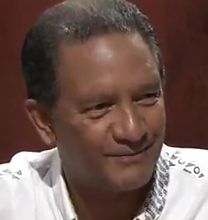 Dexter Kaiama, an attorney that represents war crime victims, was told by another attorney that Judge Harry Freitas admitted to him and the Prosecutor for Hawai‘i County in a conference call that he received a warrant from the International Criminal Court (ICC) in The Hague, Netherlands, to appear before the Court. Freitas is a District Court Judge for the Third Circuit in the city of Hilo, Island of Hawai‘i.
Dexter Kaiama, an attorney that represents war crime victims, was told by another attorney that Judge Harry Freitas admitted to him and the Prosecutor for Hawai‘i County in a conference call that he received a warrant from the International Criminal Court (ICC) in The Hague, Netherlands, to appear before the Court. Freitas is a District Court Judge for the Third Circuit in the city of Hilo, Island of Hawai‘i.
 In February 2013, Kaiama submitted the following complaint on behalf of his client with the Prosecutor of the ICC alleging Judge Harry P. Freitas committed a war crime by willfully depriving his client of a fair and regular trial prescribed by the Fourth Geneva Convention, and that Federal National Mortgage Association, and attorneys Blue Kaanehe, Charles Prather, and Peter Keegan were complicit in these proceedings and therefore committed a war crime as accessories.
In February 2013, Kaiama submitted the following complaint on behalf of his client with the Prosecutor of the ICC alleging Judge Harry P. Freitas committed a war crime by willfully depriving his client of a fair and regular trial prescribed by the Fourth Geneva Convention, and that Federal National Mortgage Association, and attorneys Blue Kaanehe, Charles Prather, and Peter Keegan were complicit in these proceedings and therefore committed a war crime as accessories.
On March 4, 2013, the Office of the Prosecutor’s Information and Evidence Unit acknowledged receipt of the complaint and assigned it case no. OTP-CR-63/13.
The International Criminal Court’s Pre-Trial Chamber (PTC) issues both arrest warrants and summons at the request of the Prosecutor. It is unlikely that Freitas received a “warrant,” but rather a “summons” to appear before the Court. “Warrants” are orders directed to governments for the arrest and apprehension of war crime suspects to ensure appearance before the Court, while “summons” are sent to war crime suspects themselves so they could voluntarily appear before the Court.
The PTC would issue a summons if there are reasonable grounds to believe that the person has committed the alleged crimes, and that the summons is sufficient to ensure appearance before the Court on a specific day and time. Both warrants and summons can be sealed by the Court, which makes them only accessible to persons authorized by the Court. And once it can be ensured that victims and witnesses can be adequately protected, the Prosecutor could apply to the Court to unseal the warrants or summons in an effort to garner international attention and support for the arrests or summons.
It appears that the proceedings and summons are under seal because there is no mention of it on the website of the ICC. In the ICC case The Prosecutor v. Bosco Ntaganda, an arrest warrant was under seal for two years. In other cases the warrants or summons were unsealed within a month. Freitas, however, appears to have been confident enough to disclose the matter to both the attorney and the Prosecutor for the County of Hawai‘i in a conference call because he did state to both that he may be traveling to Europe soon.
When Freitas disclosed to two officers of the State of Hawai‘i court that he received a summons from the ICC it should draw international attention because if Hawai‘i was a part of the territory of the United States the ICC would not have issued the summons in the first place. The United States has not agreed to the jurisdiction of the ICC and therefore the Court would have been precluded from sending a summons if Freitas was a judge within the territory of the United States of America. The acting Government acceded to the jurisdiction of the ICC, which provided the basis for the ICC to exercise jurisdiction over the Hawaiian Islands. Hawai‘i is not a part of the United States and has been under an illegal and prolonged occupation since 1898 in direct violation of international law and the law of occupation.
Los Angeles DOI and Hawaiian Community Meeting Regarding Government-to-Government Relations
The Mainland Council of the Hawaiian Civic Clubs (MCHCC) sponsored three town hall meetings “Ho`ohanohano I ko Kūpuna Na`auao” (To honor the wisdom of our ancestors). MCHCC stated that the purpose of these meetings was to bring balanced information to the community about Hawaiians’ political standing and to facilitate a grassroots discussion with leadership about the relationship between the United States Government and the Hawaiian people who live in the United States. These meetings were not only for Hawaiian Civic Club members and all Hawaiian and non-Hawaiians were welcomed to come, listen, ask questions and learn. Each meeting also had a representative from the Department of Interior to receive written testimony and answer questions.
The first town hall meeting took place in Las Vegas on July 27, 2014; the second meeting took place at California State University – East Bay in Hayward on August 9, 2014; and the third meeting took place at Springfield College in Tustin on August 10, 2014. Here are follows video of the town hall meeting in Tustin in 4 parts.
Civil Beat Publishes Professor Chang’s Article Regarding the Secretary of State
The Honolulu Civil Beat has published Professor Williamson Chang’s article “Will the Secretary of State address the single most important question raised in Hawaii since 1898.”
Professor Chang’s Open Letter to Secretary of State John Kerry: Federal Recognition of Hawaiians Raises Questions of Foreign Relations
August 11, 2014
Dear Secretary Kerry:
Aloha and welcome to the Hawaiian Islands. I am a Professor of Law at the University of Hawaiʻi William S. Richardson School of Law. I am writing in my individual capacity and on behalf of others. The views expressed here are not those of the University of Hawai’i or the School of Law.
Since you will be in Honolulu, August 13, 2014, I ask whether you would be willing to meet with the Hawaiian community. The purpose of this meeting would be to clarify a legal issue of foreign relations that has become of critical importance to all in Hawaii these past months.
The Department of Interior, in June and July of this year held 15 statewide hearings as to whether to proceed with rulemaking that would result in administrative action recognizing Native Hawaiians as a federally recognized tribe. The testimony taken revealed that the single most important issue to the hundreds testifying was whether the United States has sovereignty over the Hawaiian Islands and whether the Kingdom of Hawai’i, a sovereign and independent nation continues to exist. This is a legal, not a political issue. We seek that you ask the Department of Justice, Office of Legal Counsel, to opine on whether the Kingdom of Hawai’i, as a subject of international law, ceases to exist in light of the international rule of law regarding the presumption of continuity.
The continued existence of the Kingdom would render the Department of Interior’s proposal legally questionable. The existence of the Kingdom raises the question that Hawai’i is occupied by the United States in violation of international and United States law. As a result, such occupation has extraordinary ramifications as to current United States foreign policy around the world because of the Kingdom of Hawai’i’s treaties with other independent nations. Officials of the Departments of Interior and Justice who represented the United States at these hearings did not answer these questions deferring to the Department of State as the appropriate agency.
These issues were also raised by a State official, Dr. Crabbe, Chief Executive Officer of the Office of Hawaiian Affairs, an agency of the State of Hawai’i, in a letter, made public, to you. Although that letter was withdrawn by trustees of the Office of Hawaiian Affairs, its relevancy was affirmed by hundreds of those testifying who cited to it. It contains a more detailed explanation of points raised herein. A copy of Dr. Crabbe’s complete letter of May 5, 2014 can be found at: http://www.oha.org/news/oha%E2%80%99s-top-executive-makes-formal-request-us-department-state-legal-opinion-current-status-hawai (last checked August 4, 2014 4:10 PM.)
Moreover, a more detailed letter of mine, further discussing these issues, is being sent to your office in Washington D.C.
I can be reached through my offices at the University of Hawaii. Mahalo and Respectfully yours, Professor Williamson B.C. Chang, William S. Richardson School of Law, University of Hawaii at Manoa.
Williamson Chang,
Professor of Law, University of Hawaii
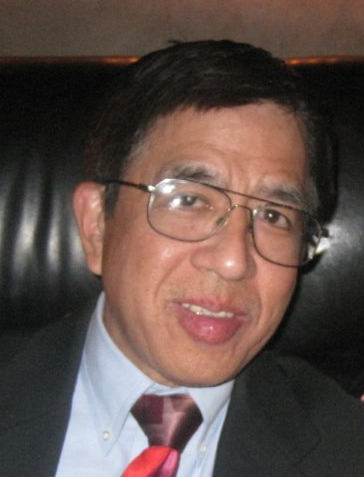 Professor Williamson Chang was born and raised in Honolulu, Hawai‘i. He graduated from Princeton University with degrees in Asian Studies and from the Woodrow Wilson School of Public and International Affairs. Thereafter, he attended the University of California, Berkeley [Boalt Hall] where he was an editor of both the California Law Review and the Ecology Law Quarterly. He clerked for U.S. District Court Judge Dick Yin Wong in Honolulu and began teaching at the University of Hawai`i the following year.
Professor Williamson Chang was born and raised in Honolulu, Hawai‘i. He graduated from Princeton University with degrees in Asian Studies and from the Woodrow Wilson School of Public and International Affairs. Thereafter, he attended the University of California, Berkeley [Boalt Hall] where he was an editor of both the California Law Review and the Ecology Law Quarterly. He clerked for U.S. District Court Judge Dick Yin Wong in Honolulu and began teaching at the University of Hawai`i the following year.
Update: The Civil Beat Published Dr. Sai’s Open Letter to Kia‘aina
The Honolulu Civil Beat has published Dr. Keanu Sai’s letter to Assistant Secretary of Insular Affairs, Esther Kia‘aina, as an “open letter.”
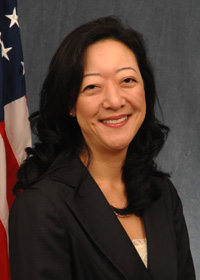 Yesterday at a U.S. Department of Interior meeting held in Los Angeles, California, on August 10, 2014, regarding the proposed rule change to recognize Native Hawaiians as a domestic tribe, Assistant Secretary of Policy, Management and Budget for the Department of Interior, Rhea Suh, stated to Dr. Sai that Secretary of the Interior Sally Jewell was forwarded a copy of the letter and that they will be making a direct request to the Department of Justice’s Office of Legal Counsel to respond to his letter. Dr. Sai’s letter stated:
Yesterday at a U.S. Department of Interior meeting held in Los Angeles, California, on August 10, 2014, regarding the proposed rule change to recognize Native Hawaiians as a domestic tribe, Assistant Secretary of Policy, Management and Budget for the Department of Interior, Rhea Suh, stated to Dr. Sai that Secretary of the Interior Sally Jewell was forwarded a copy of the letter and that they will be making a direct request to the Department of Justice’s Office of Legal Counsel to respond to his letter. Dr. Sai’s letter stated:
“I am respectfully calling upon you, as Assistant Secretary of Insular Affairs, to immediately submit a formal request to have the OLC provide an exhaustive legal analysis within the framework of international law that shows the Hawaiian Kingdom was extinguished. To not do so is to admit to the United States’ illegal occupation of Hawai‘i.”

